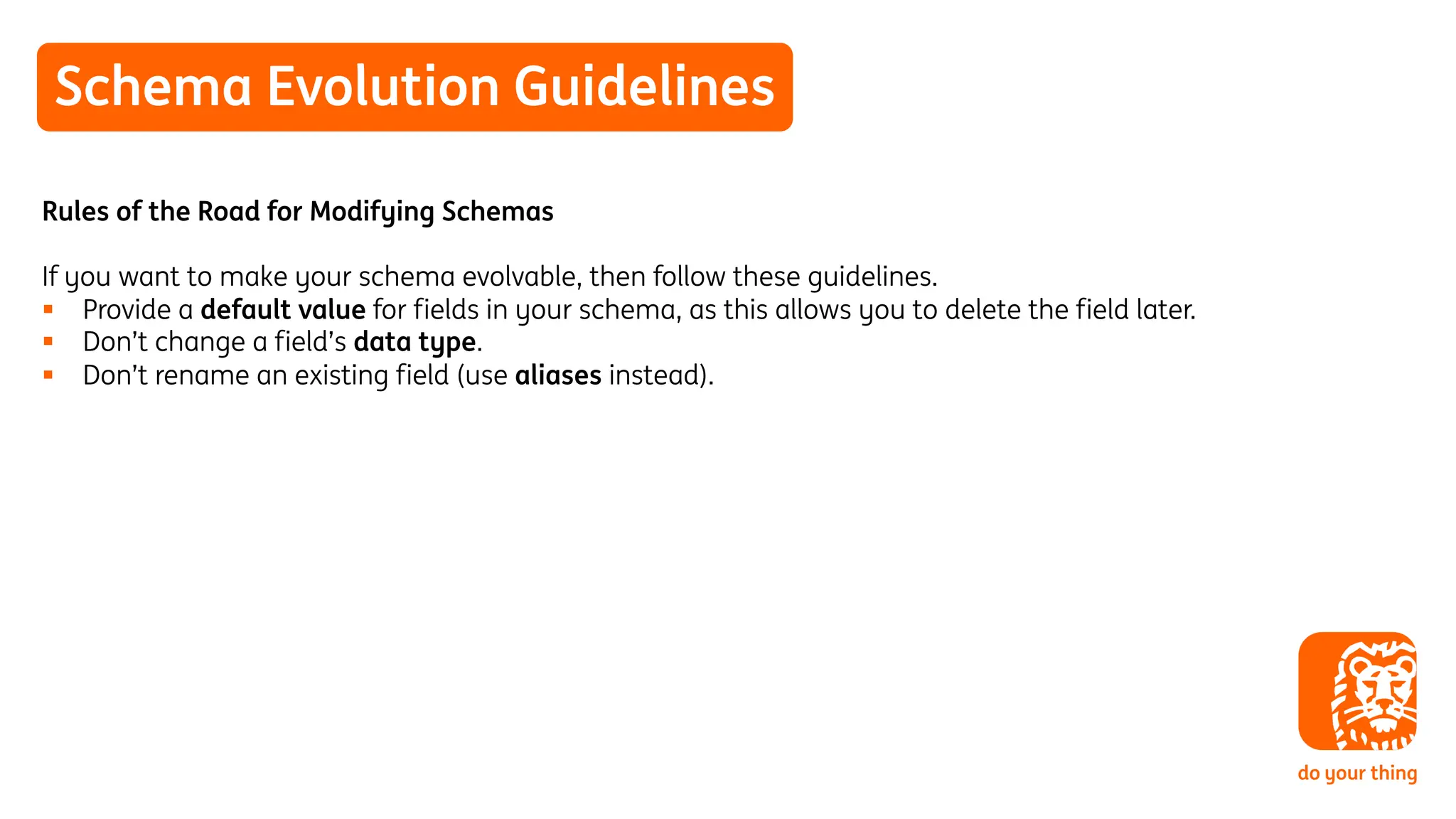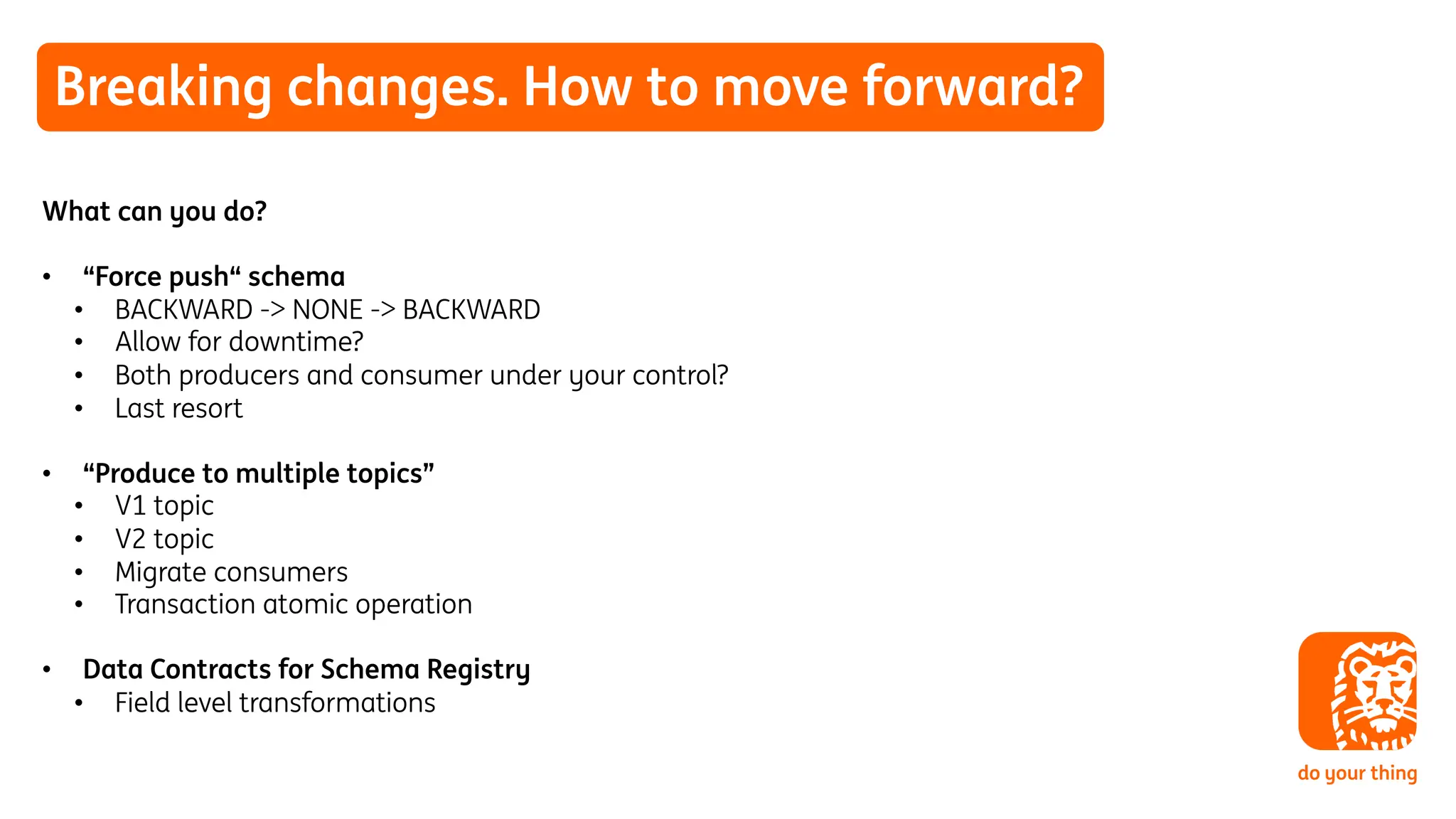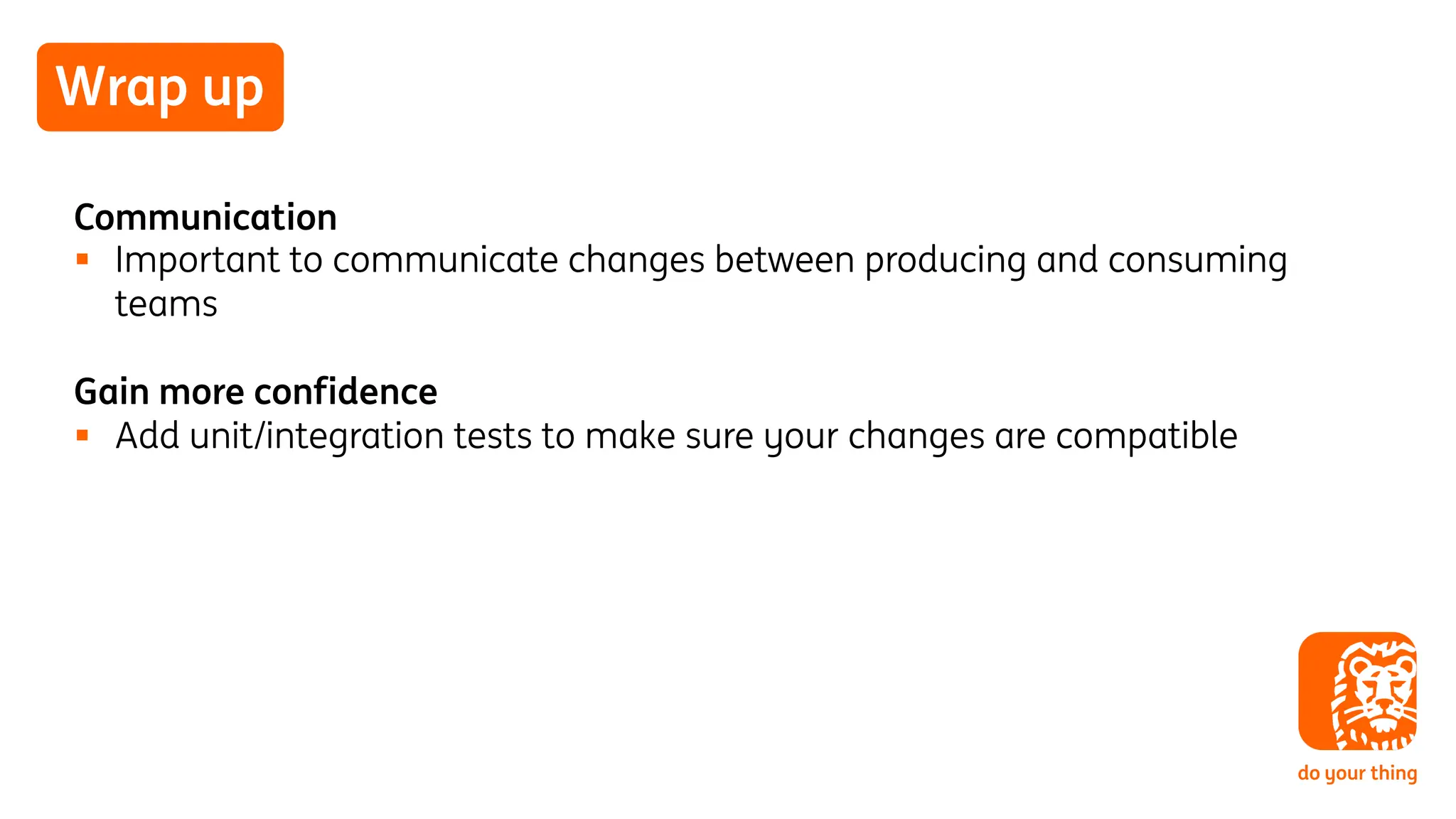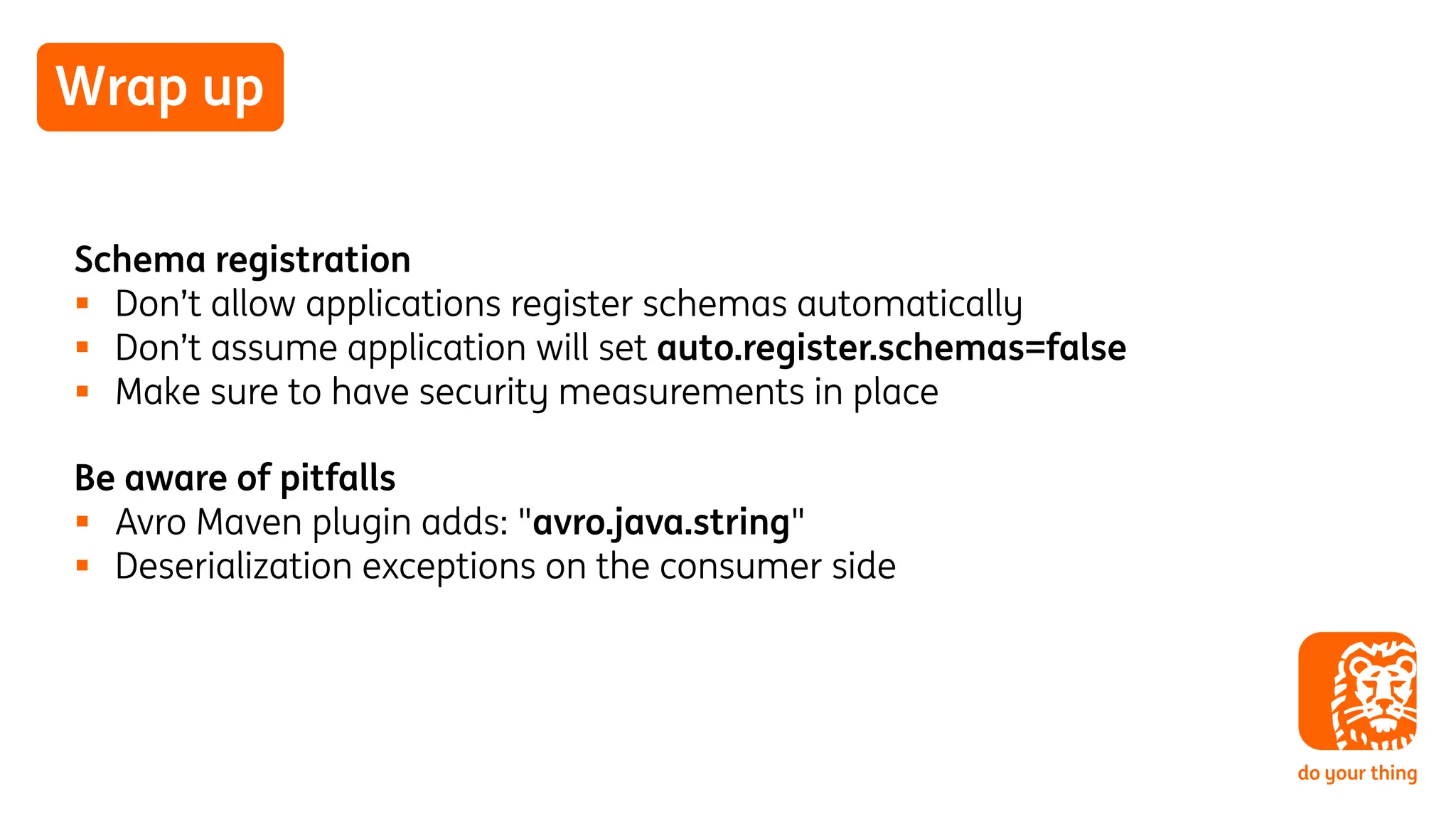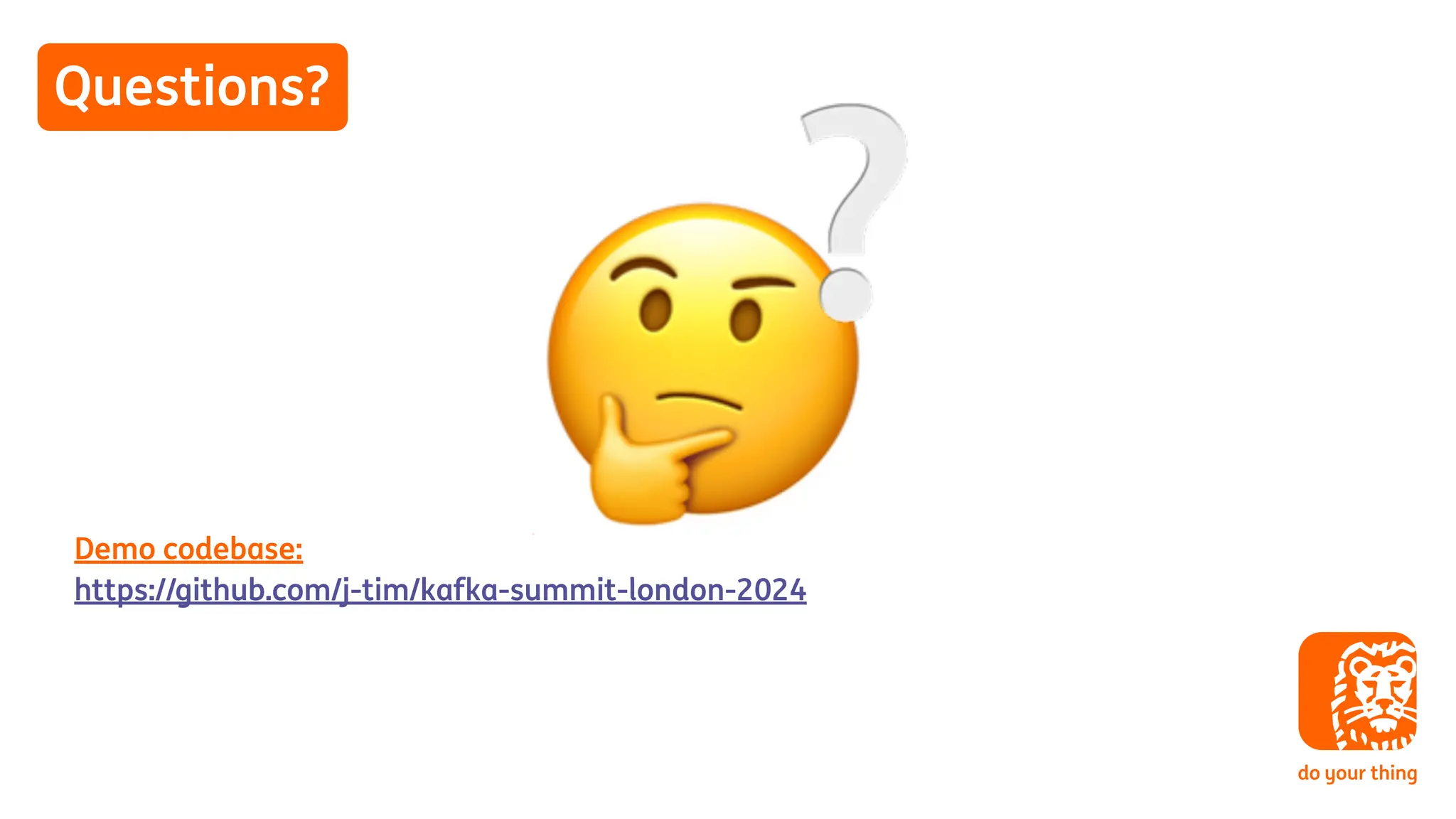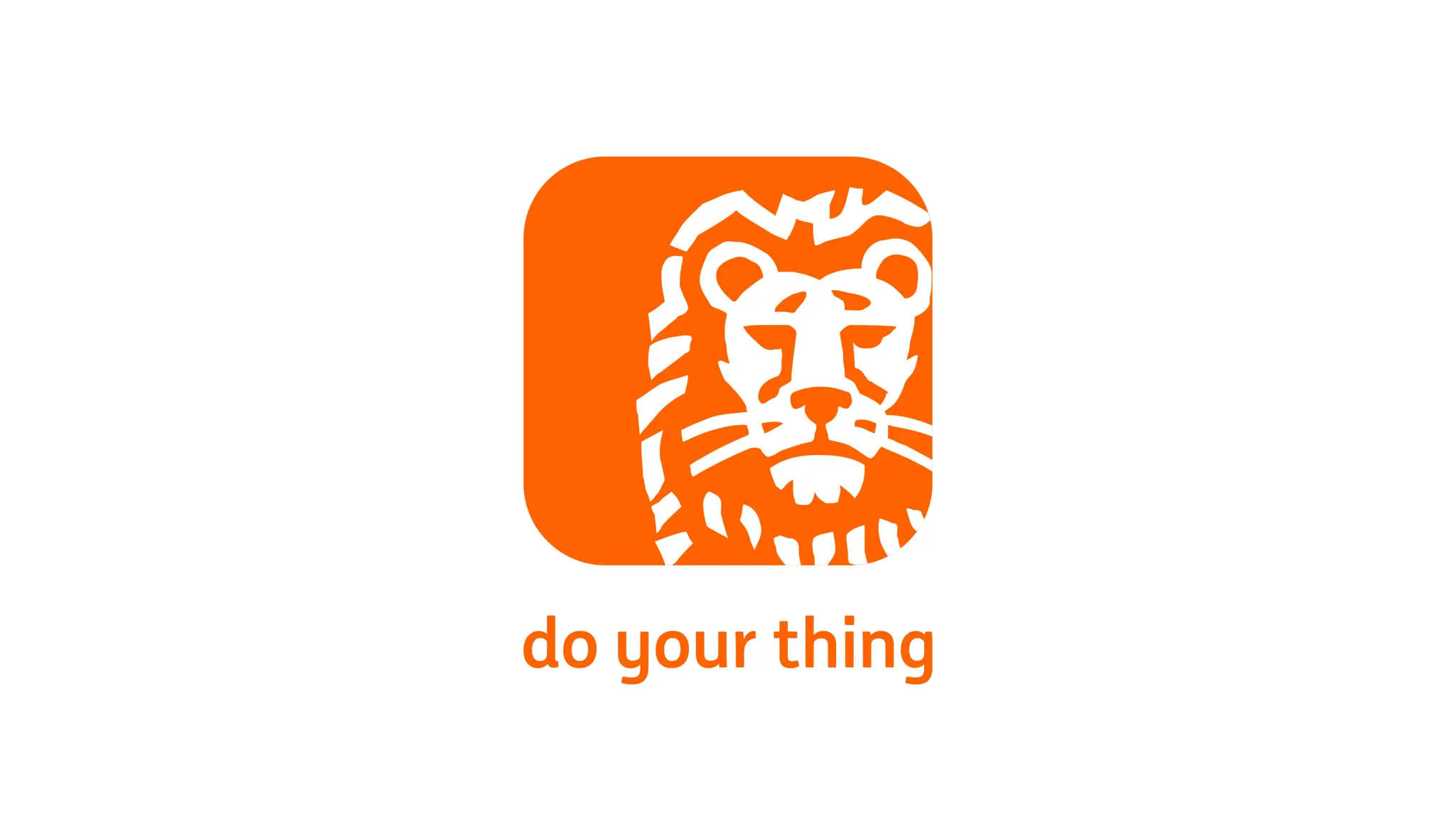The document discusses the importance of Avro schema compatibility in Kafka, emphasizing the role of schemas in managing evolving data structures within streaming applications. It covers topics such as schema registration, compatibility levels, and how to implement changes without causing disruptions to existing services. Additionally, it provides insights on generating Java classes from Avro schemas and automated testing strategies.
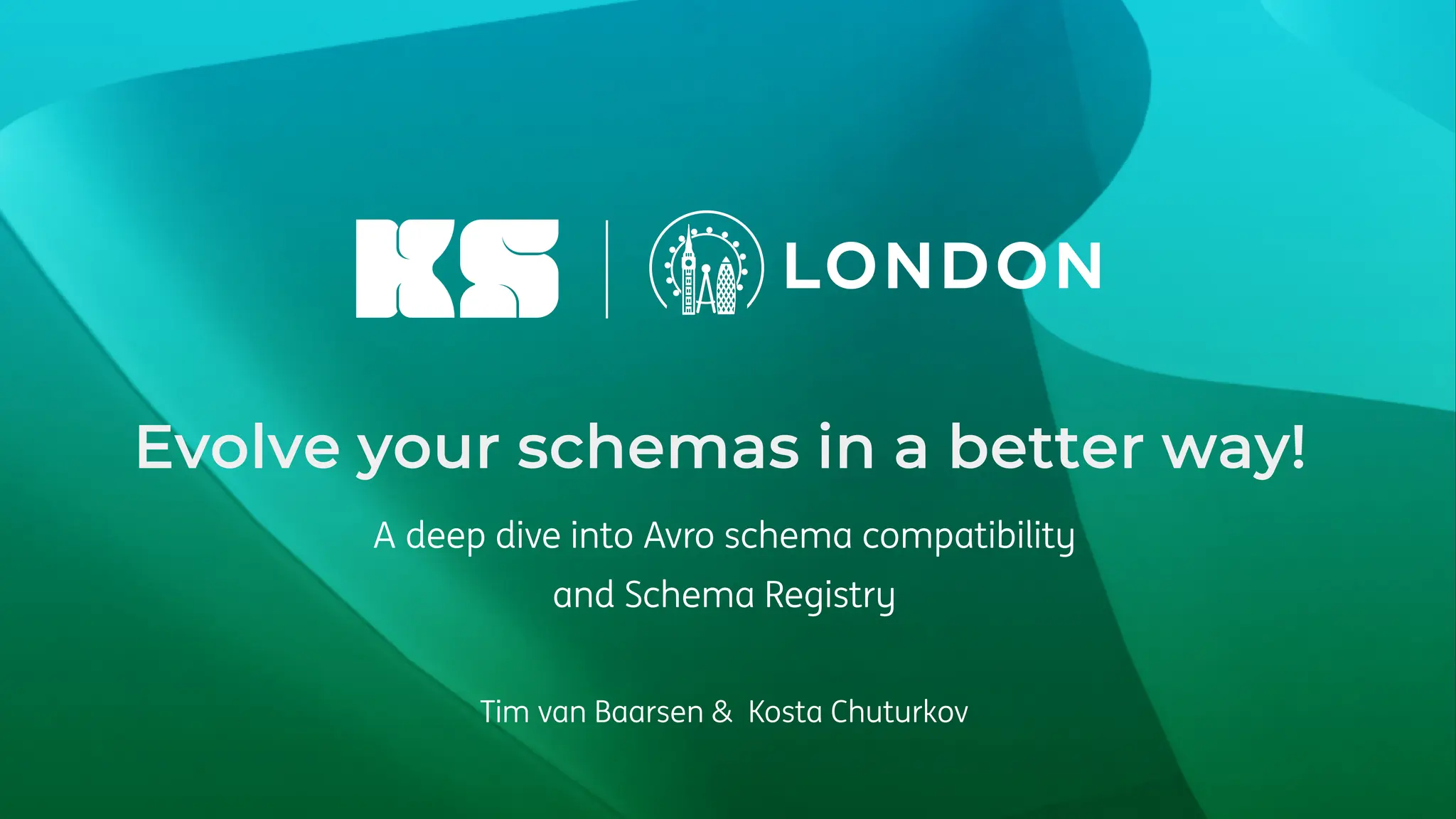
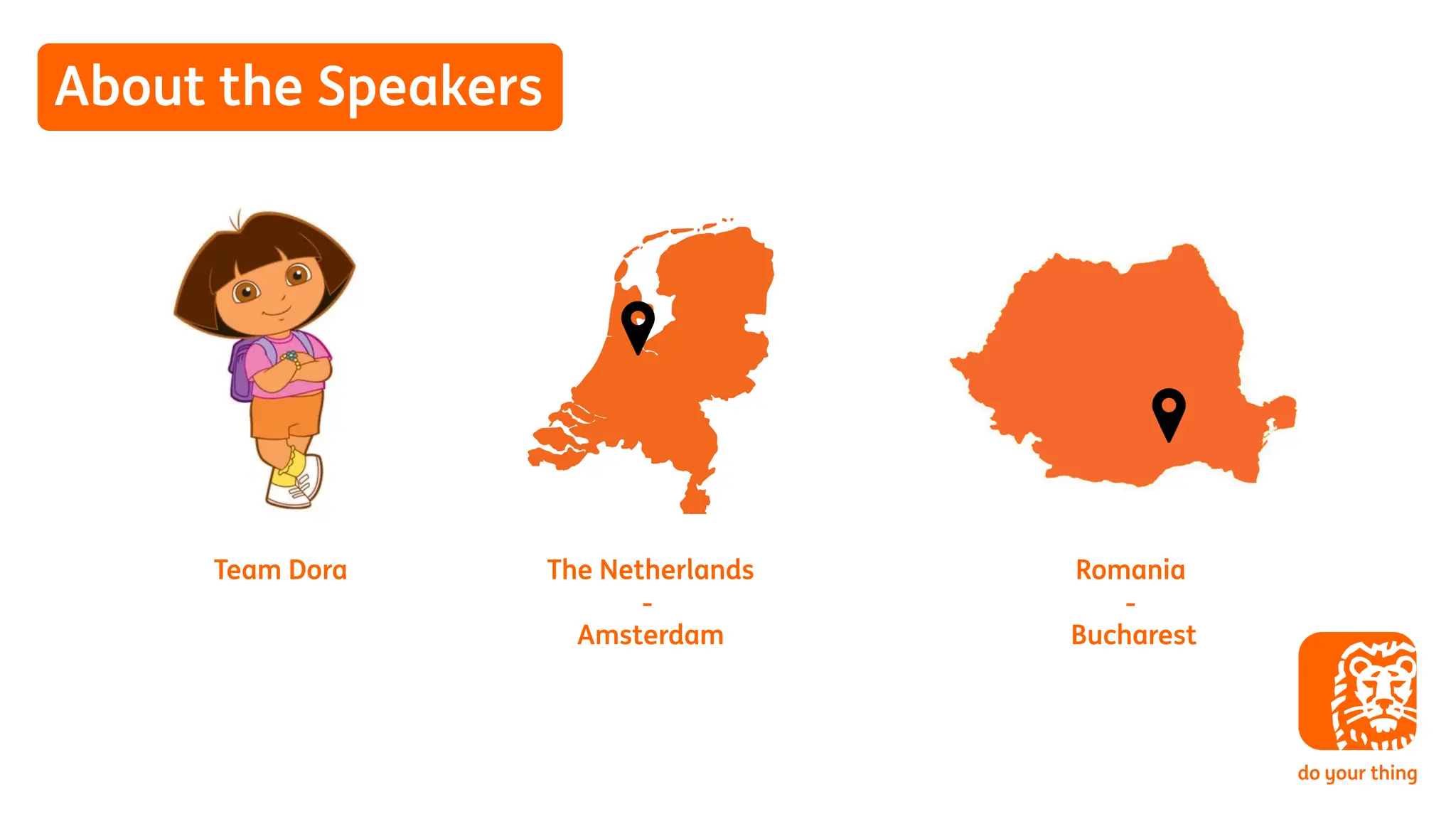
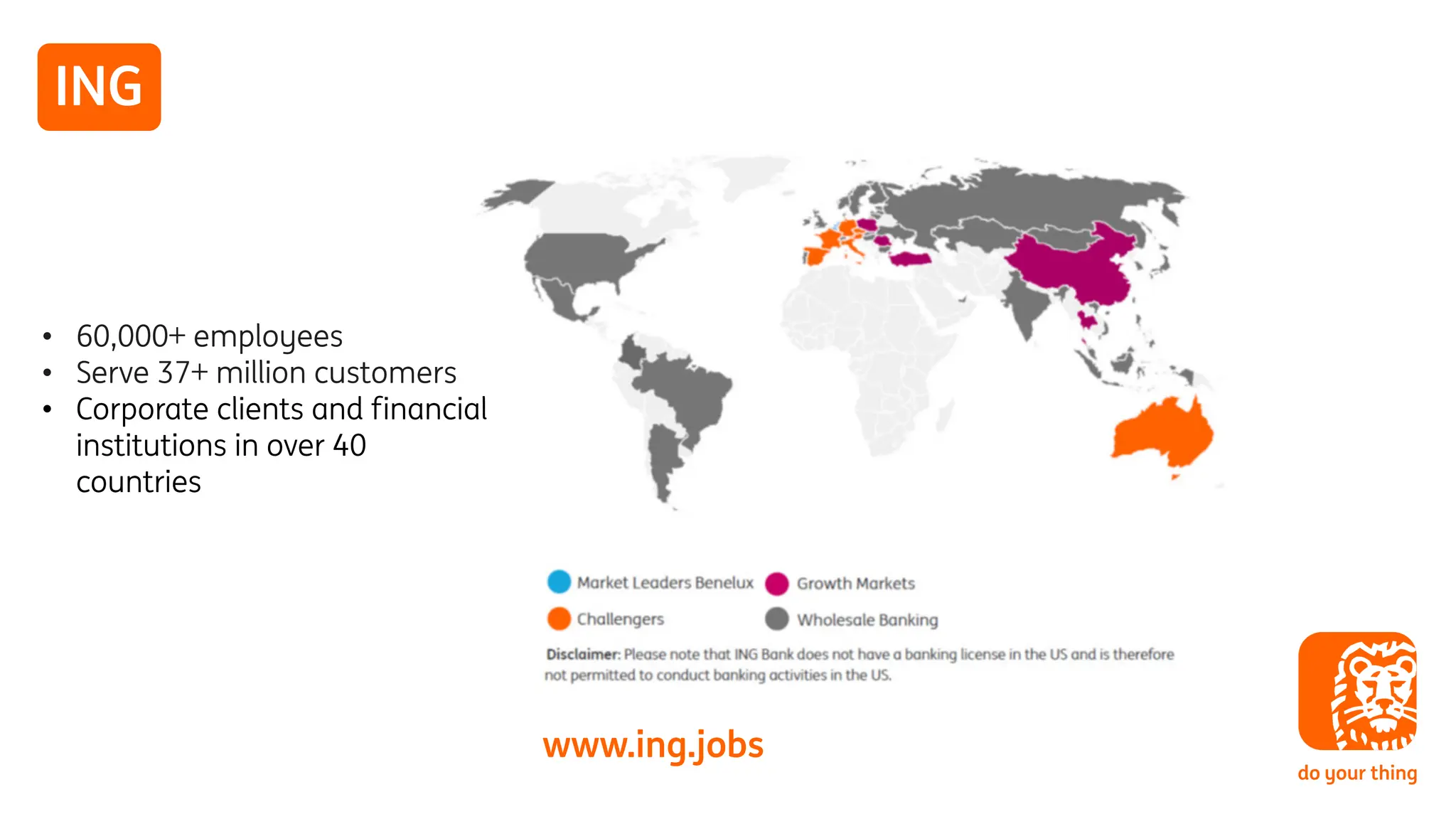
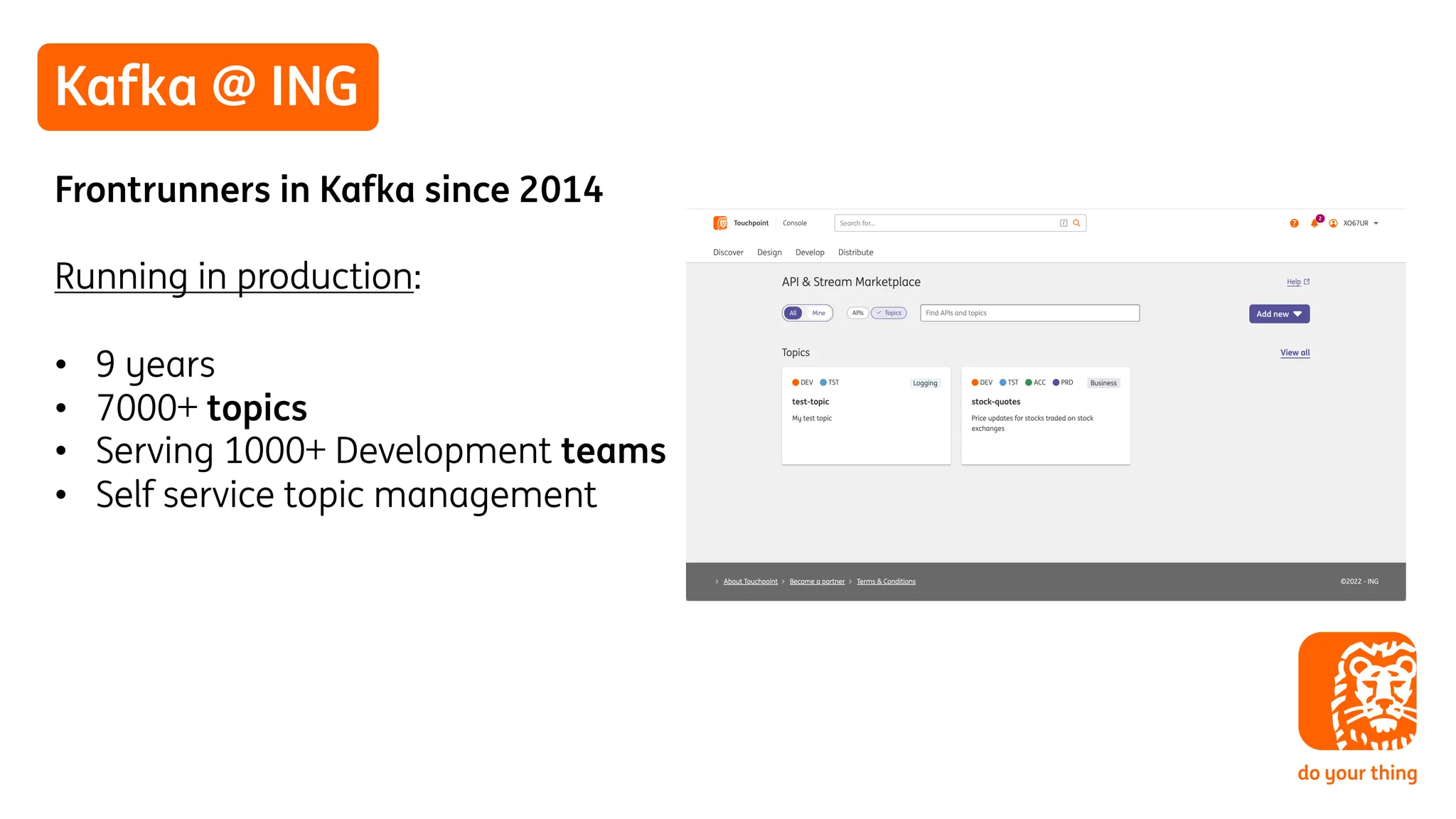
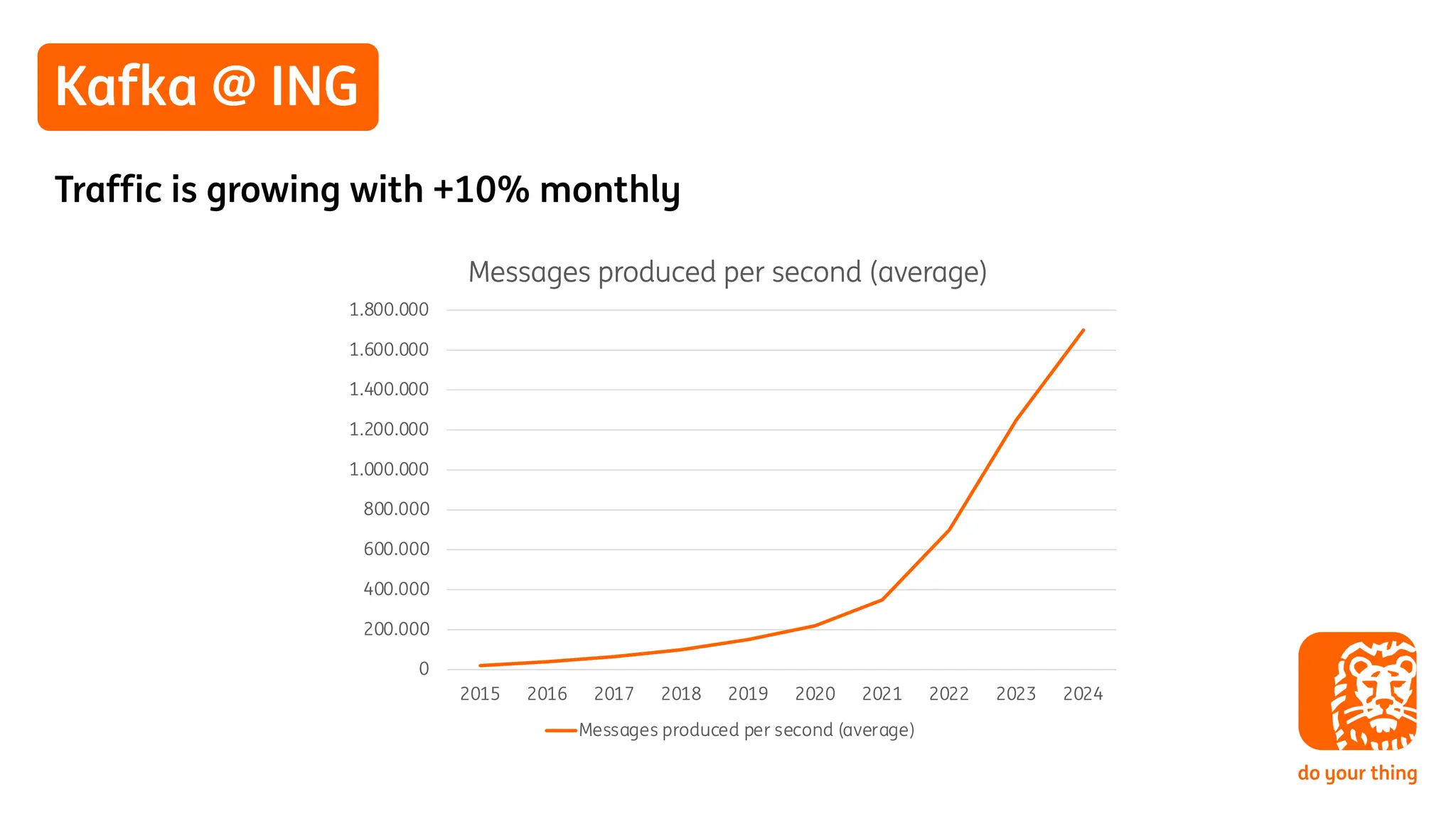
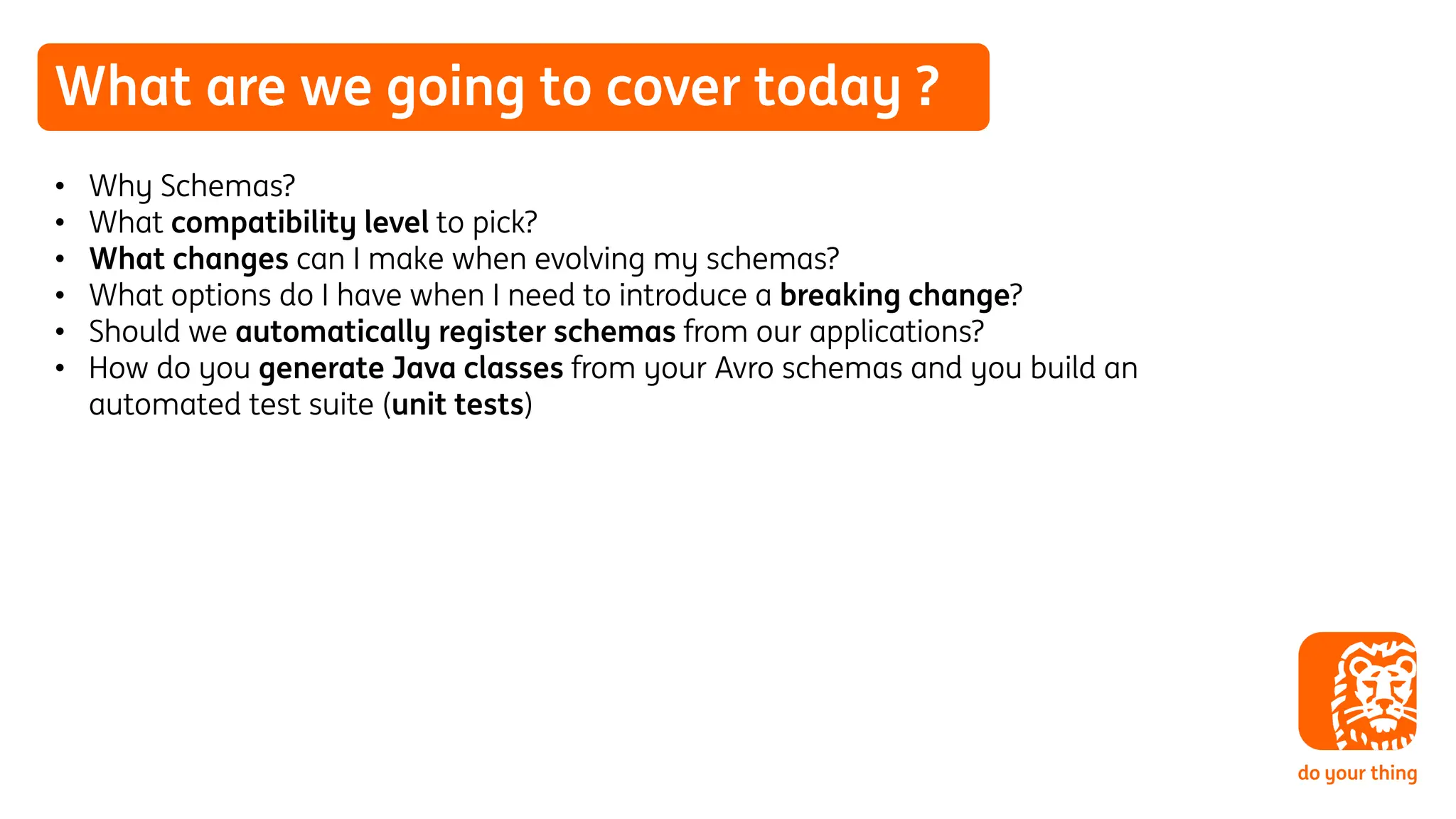
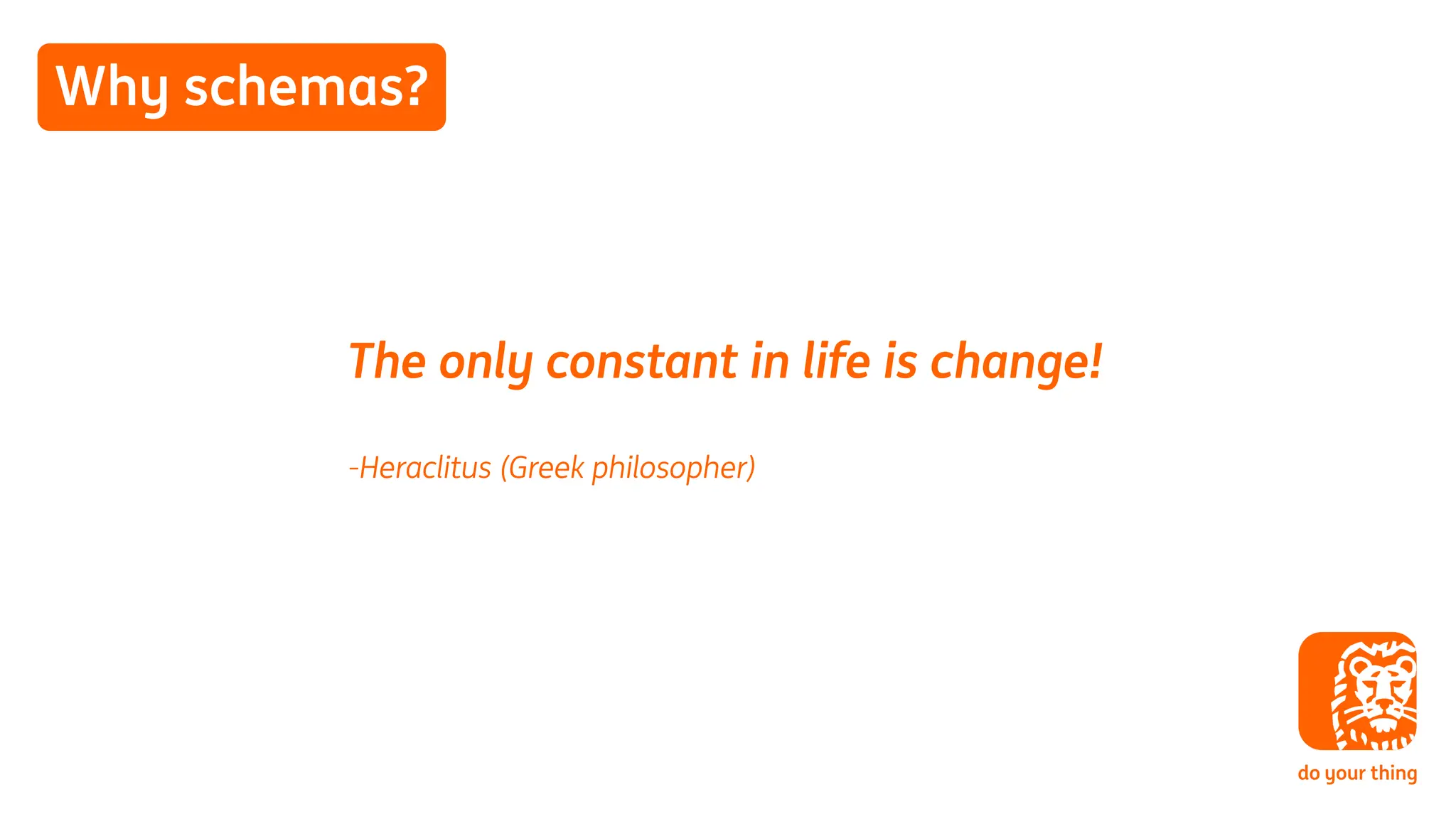
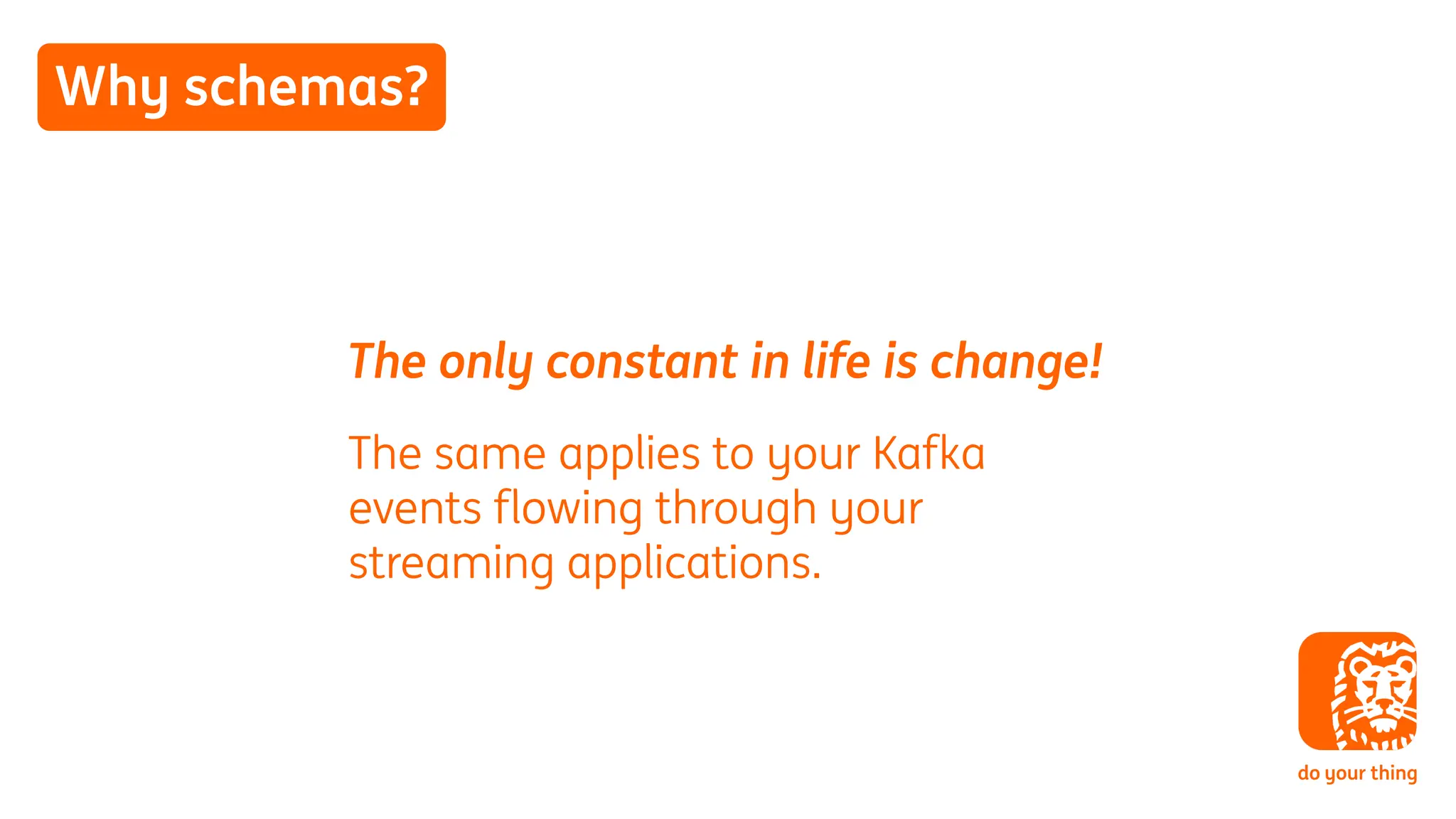
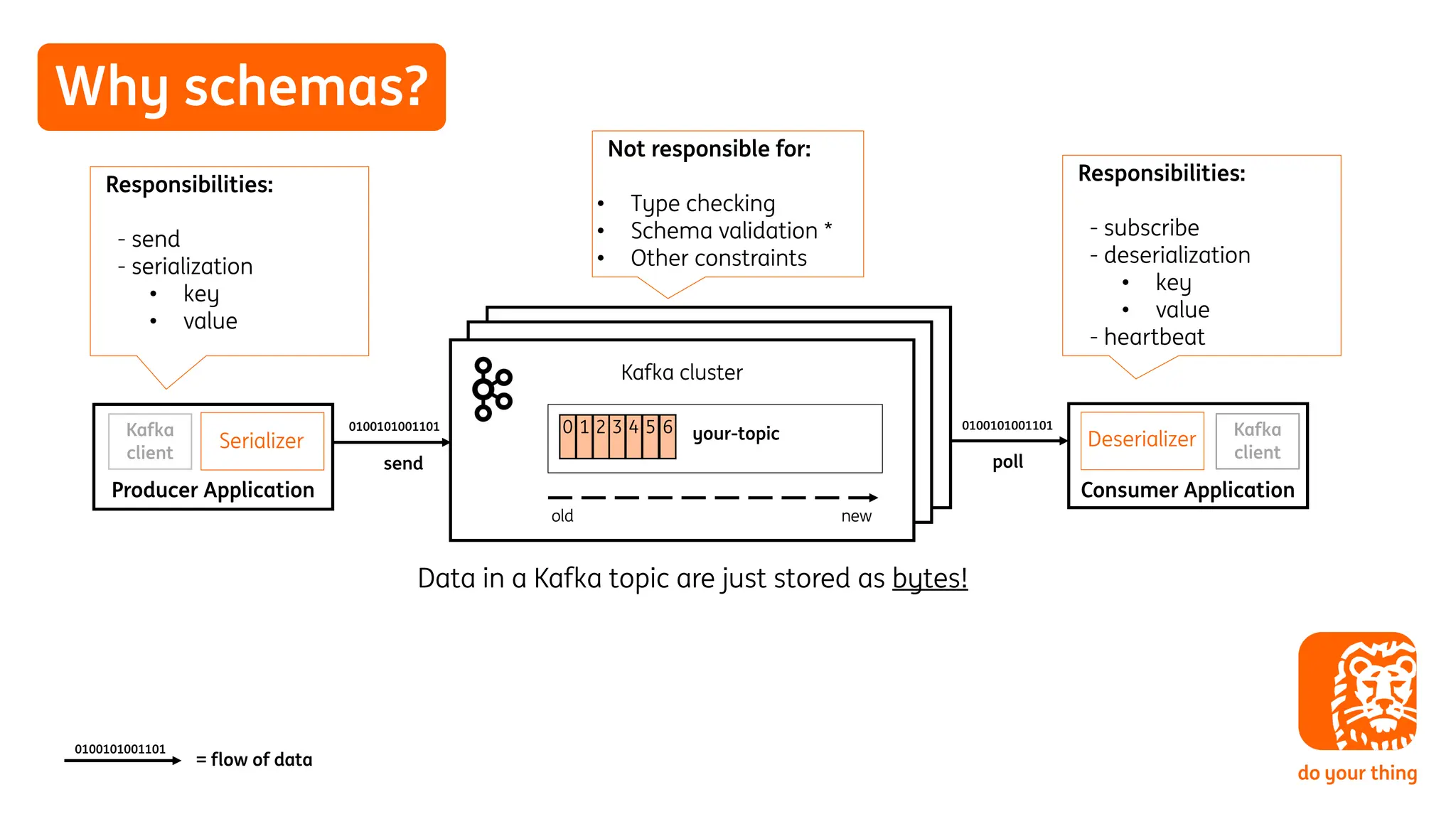
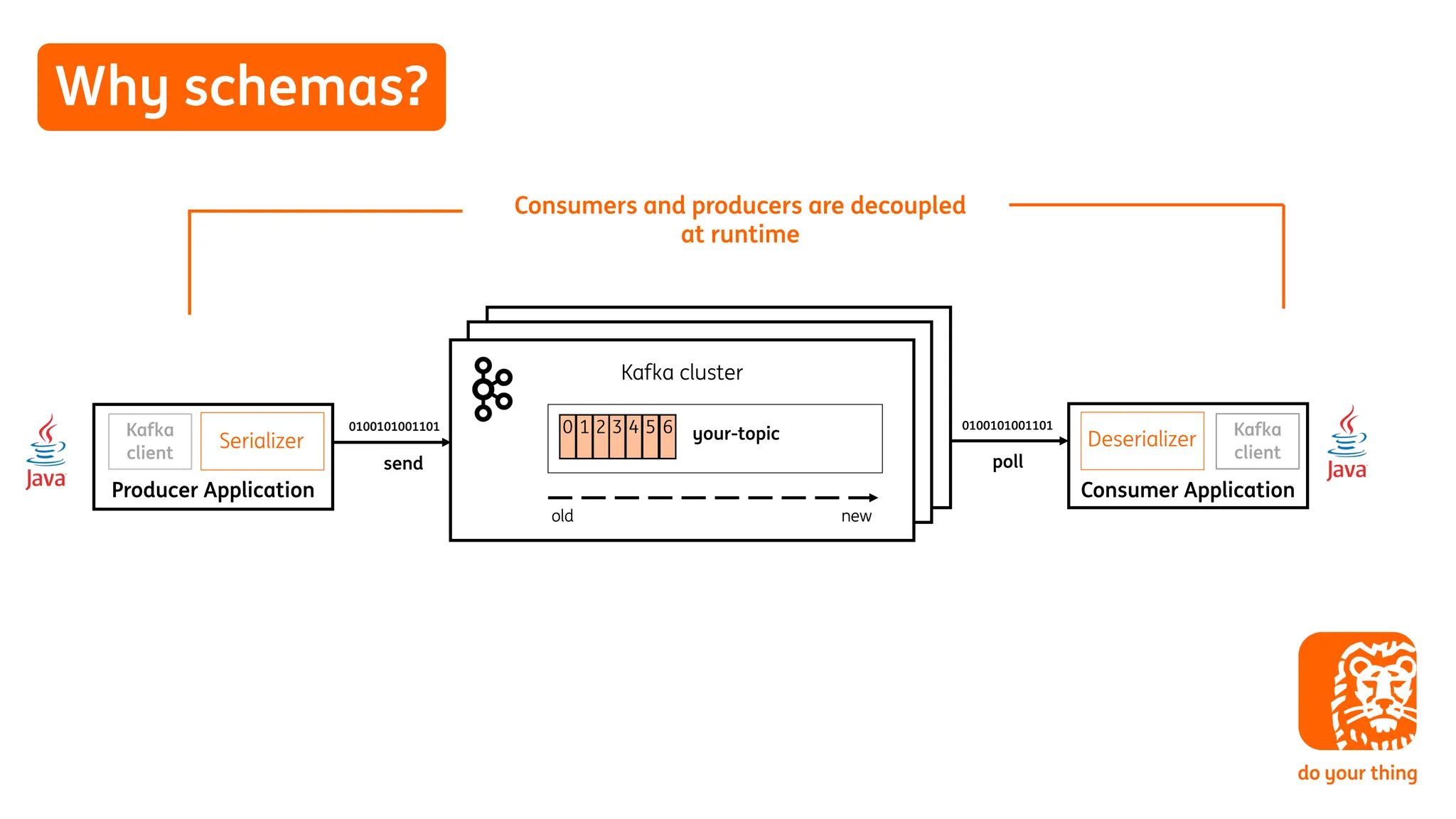
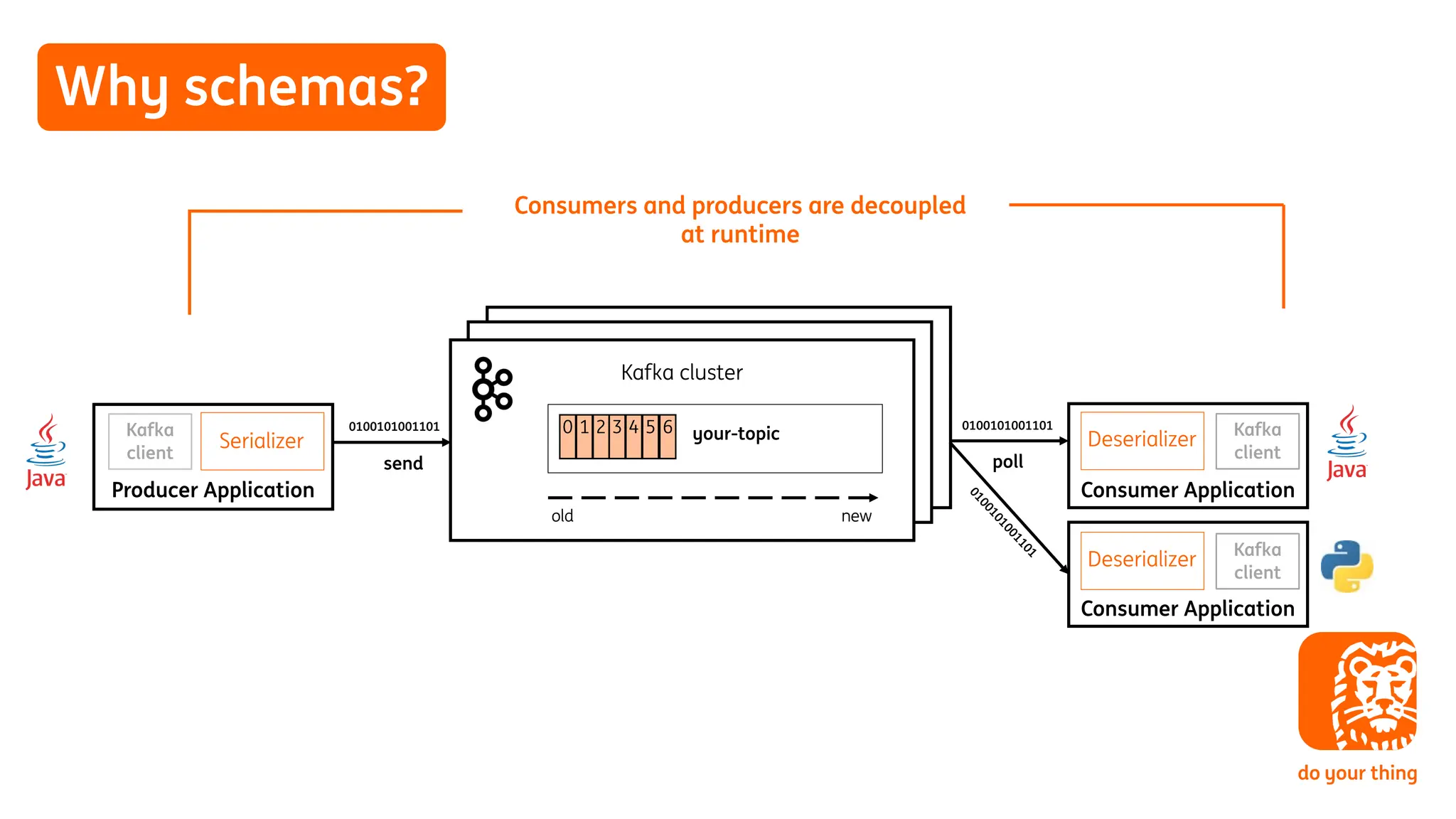
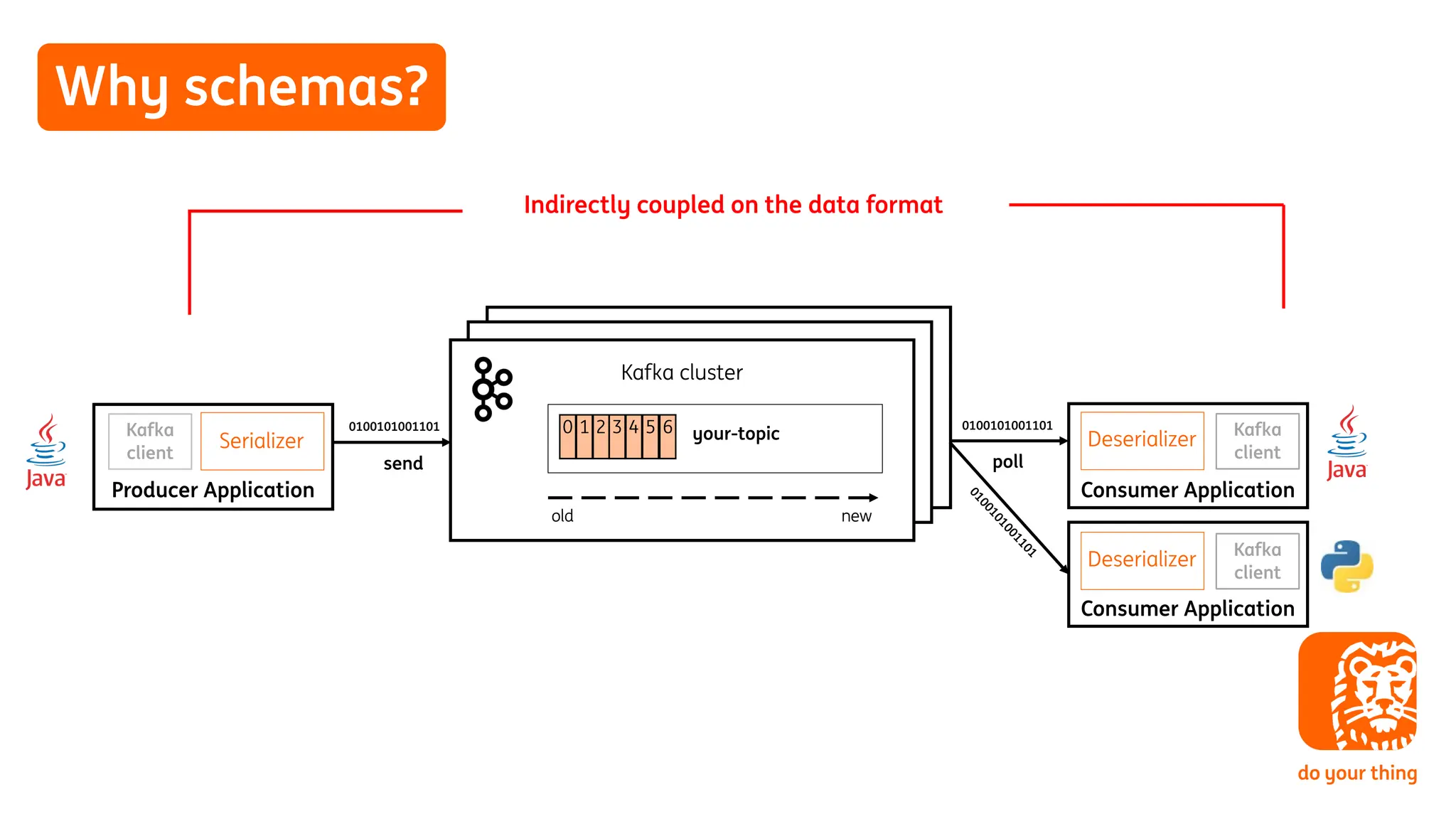
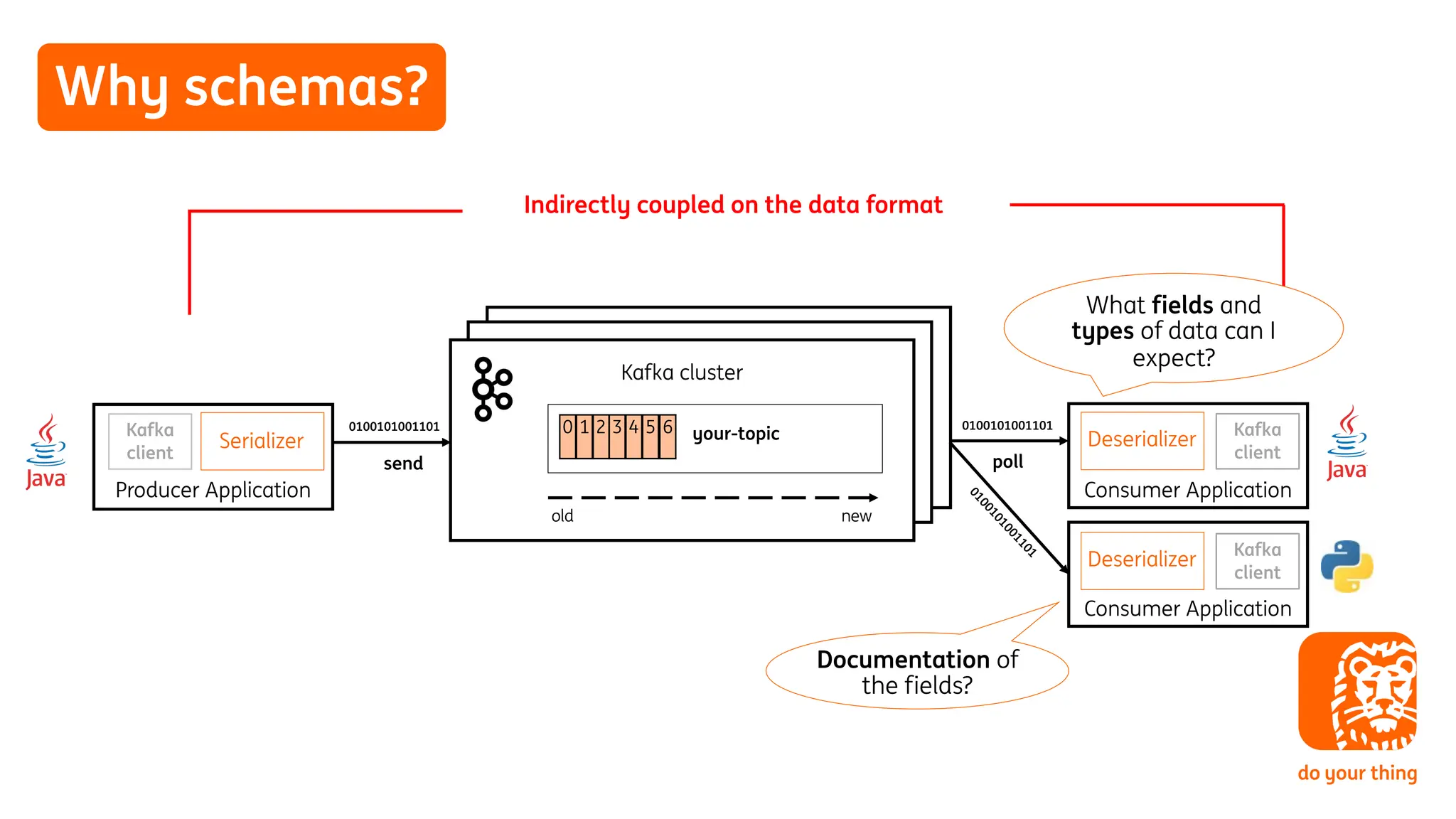
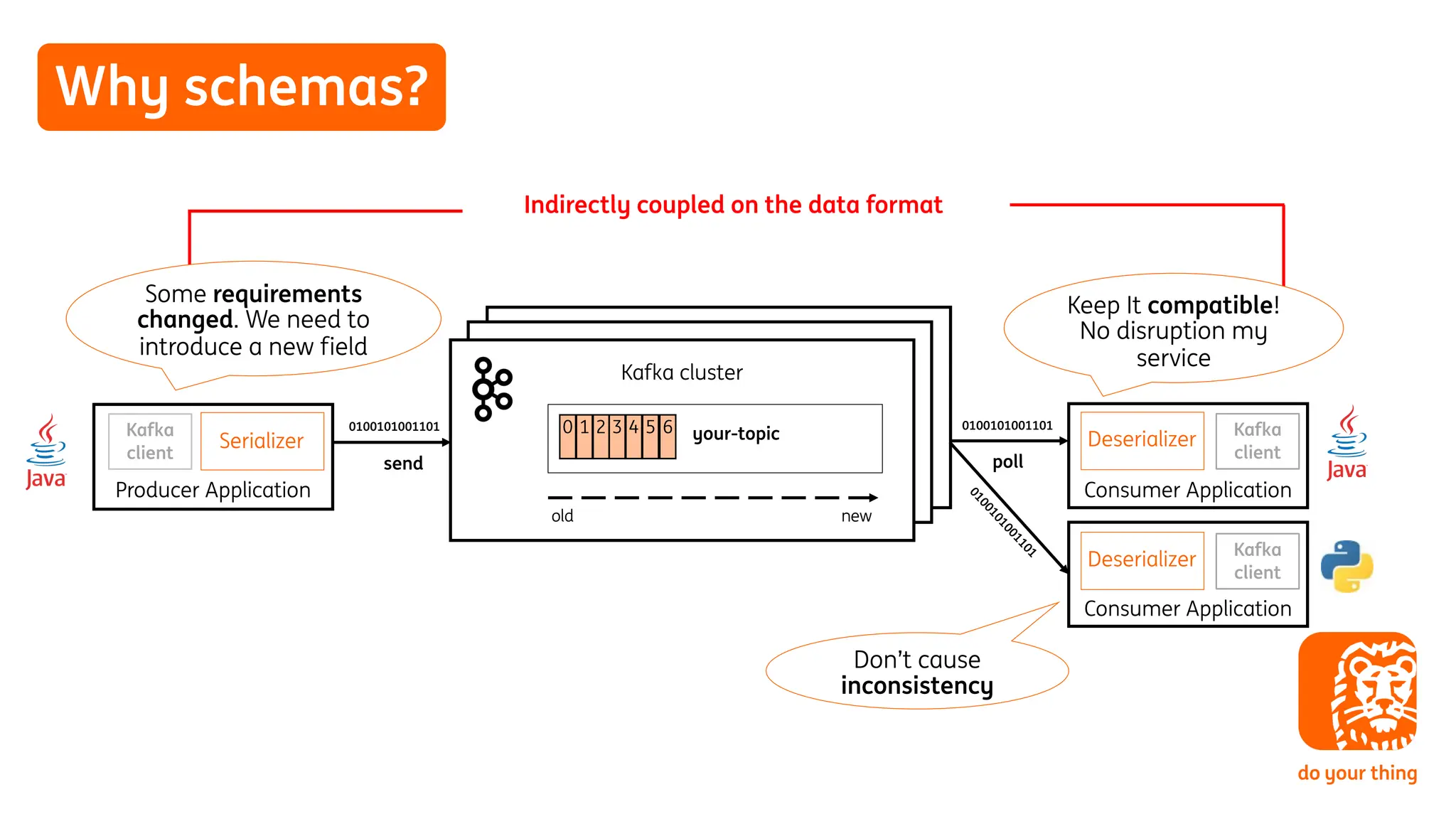
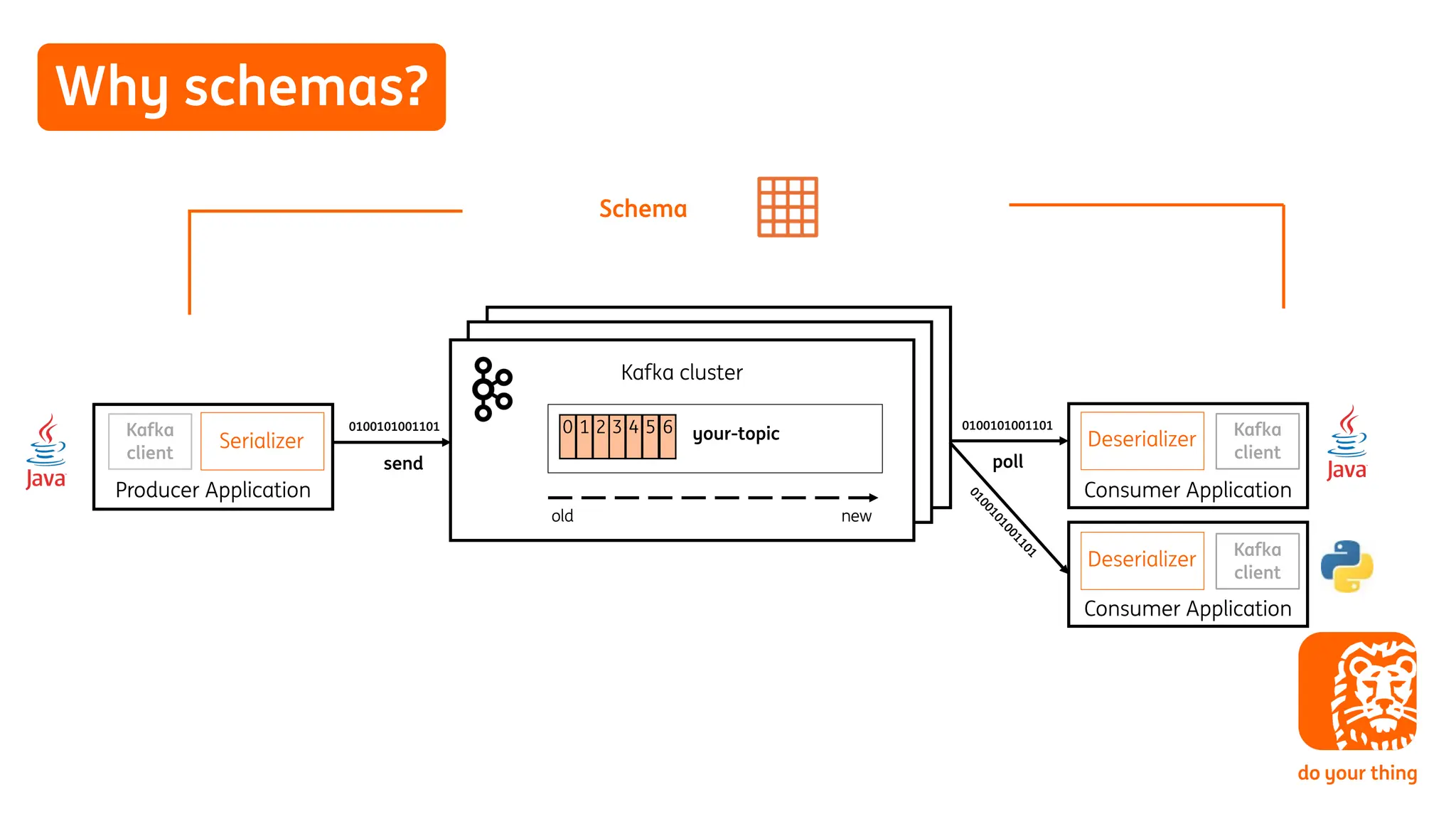
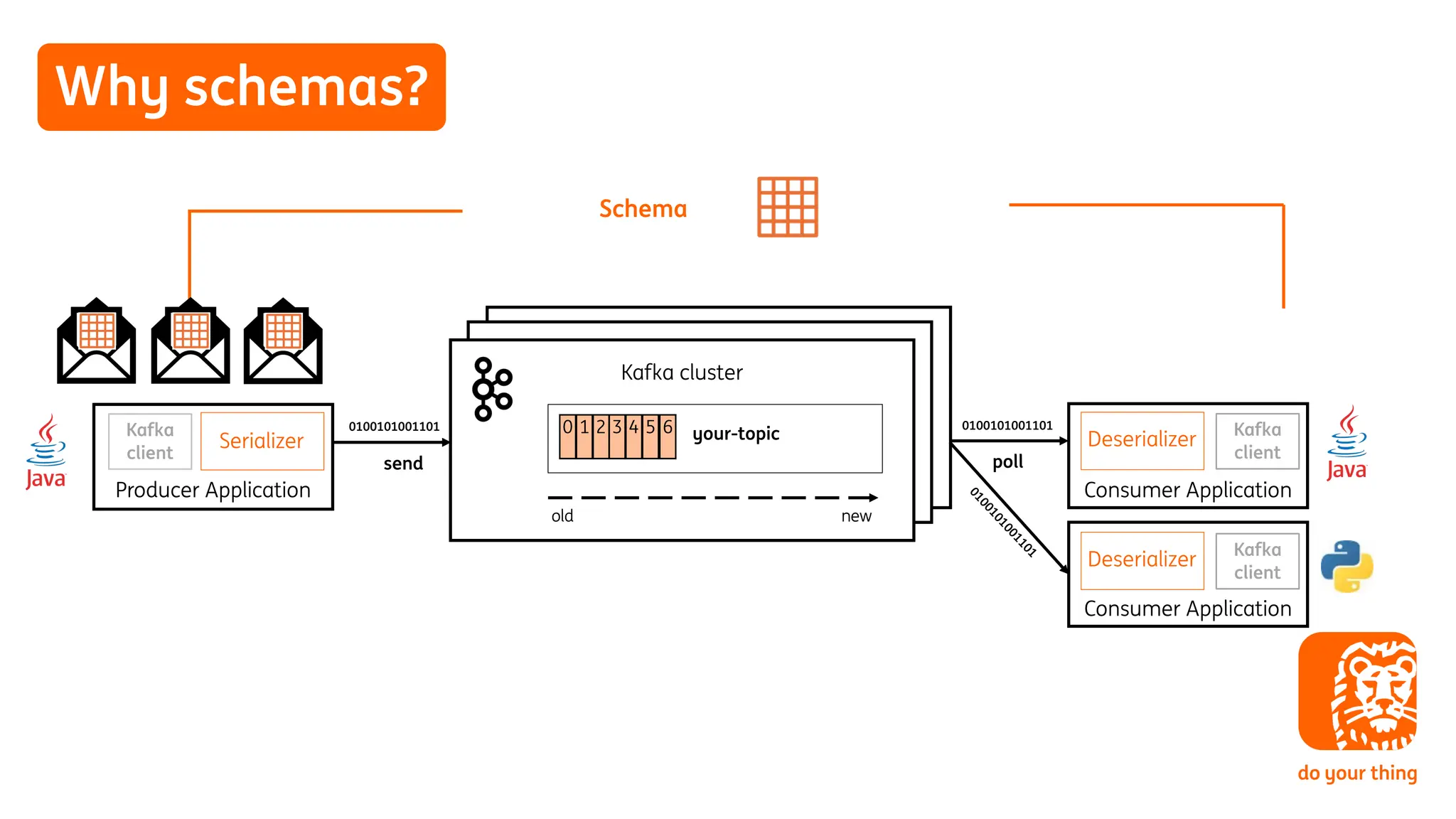
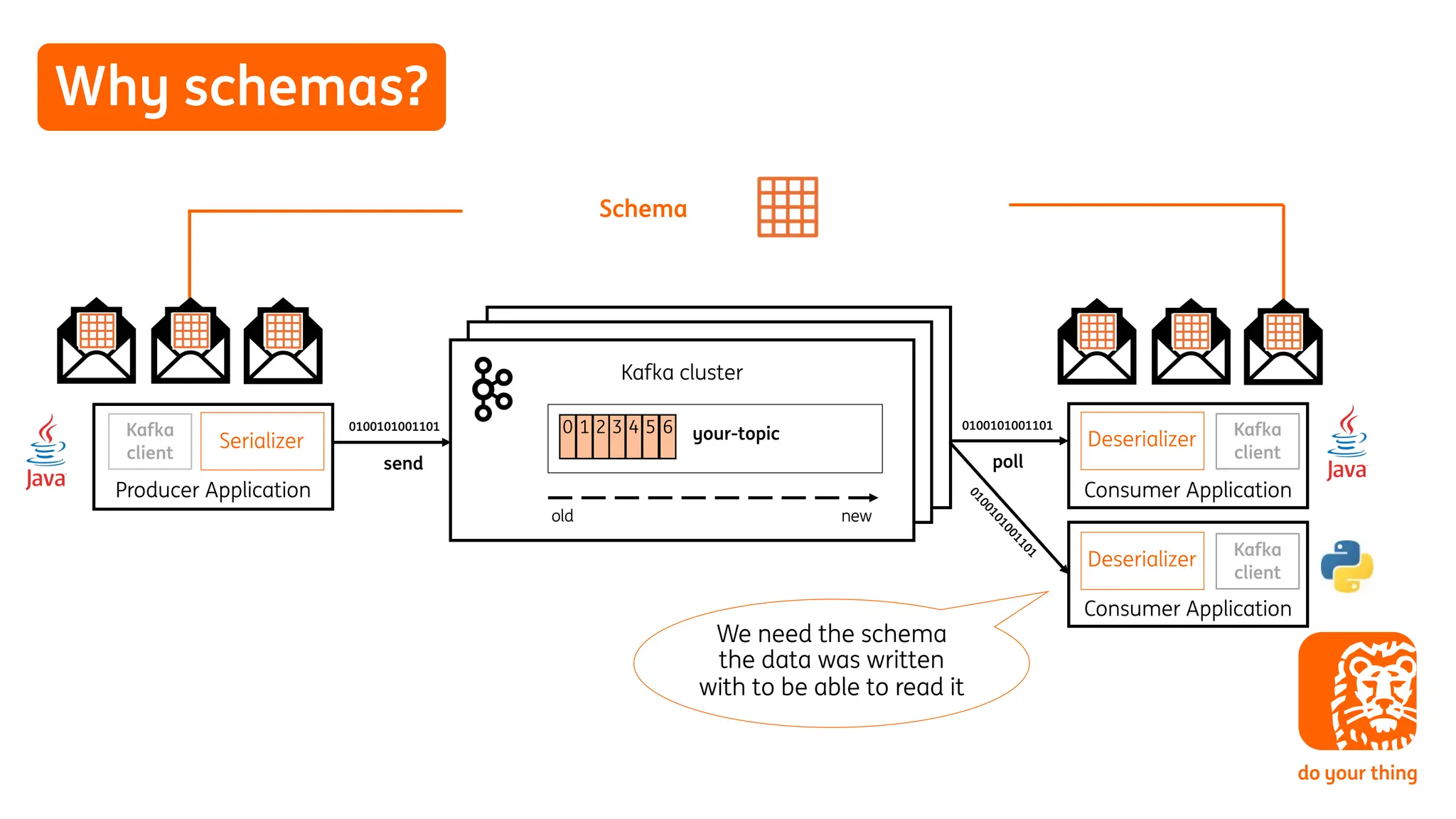
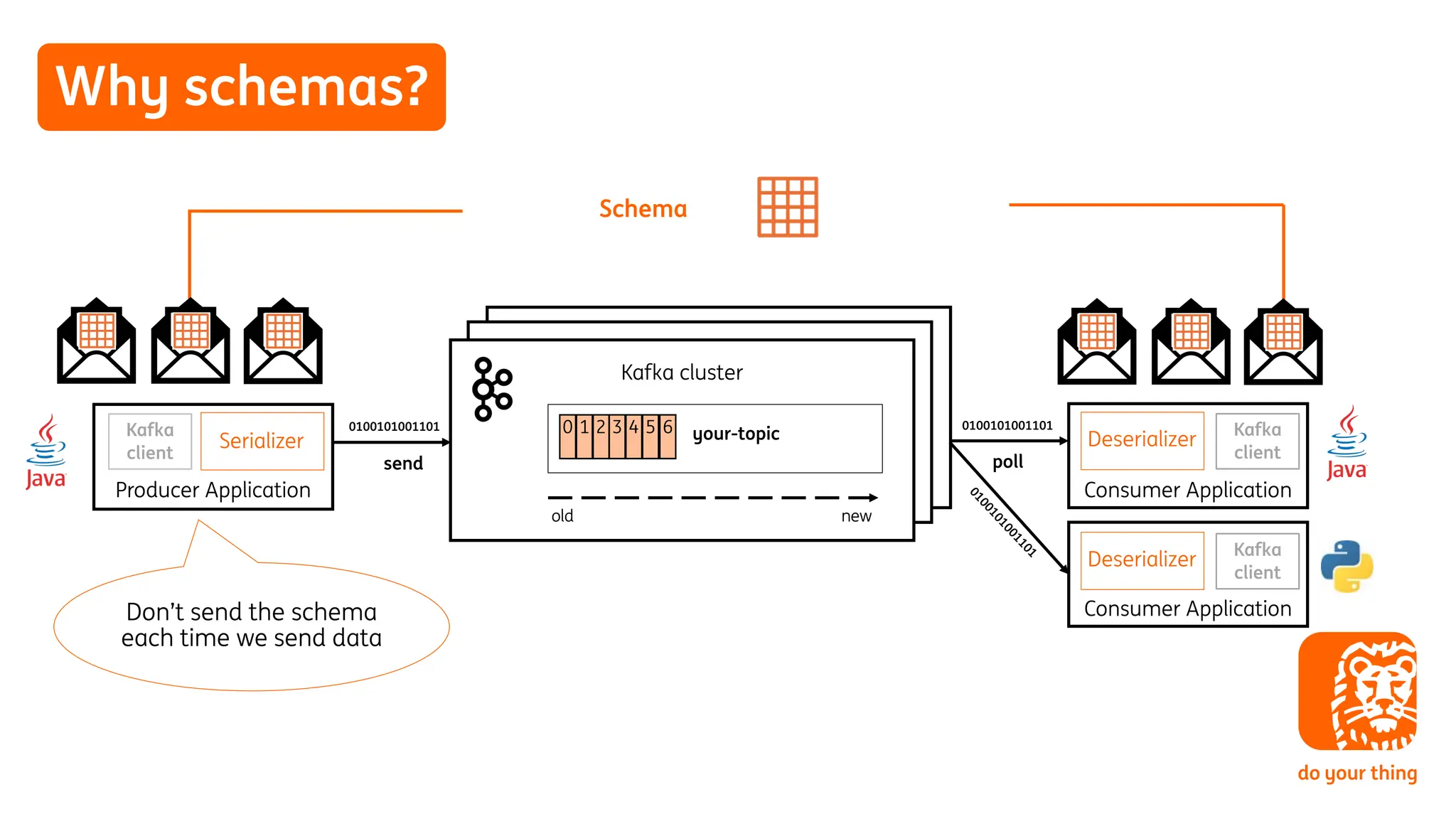
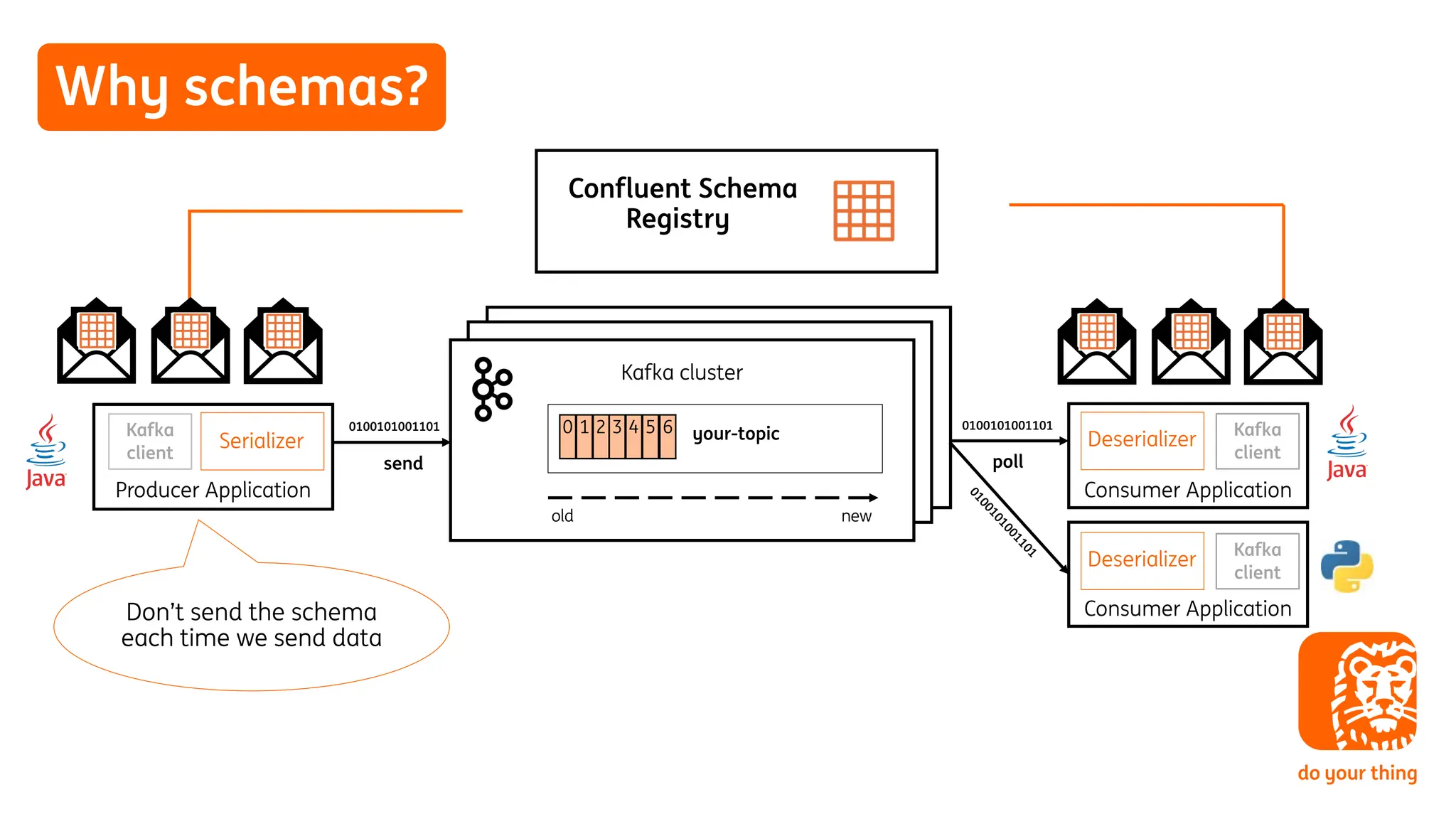
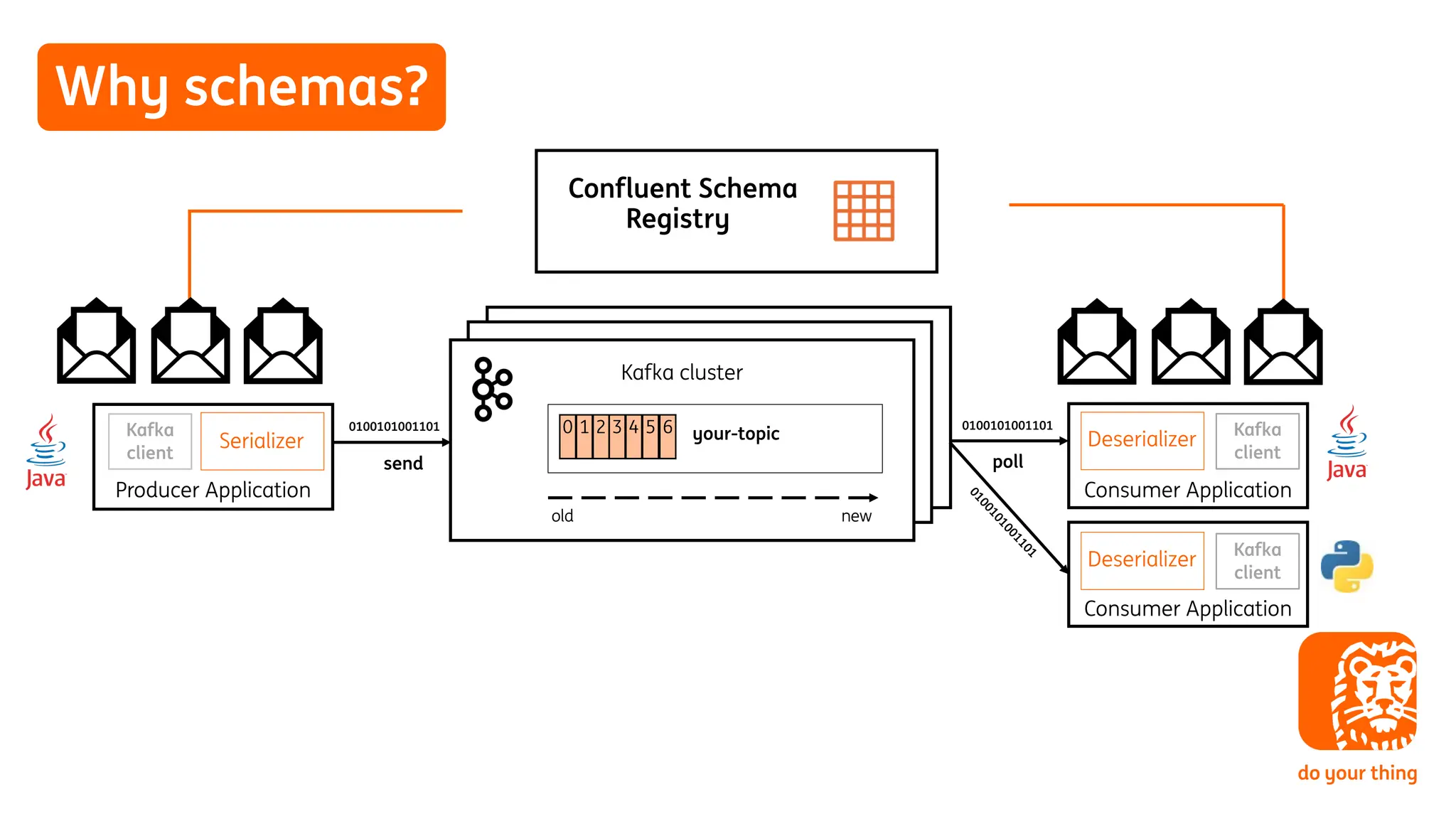
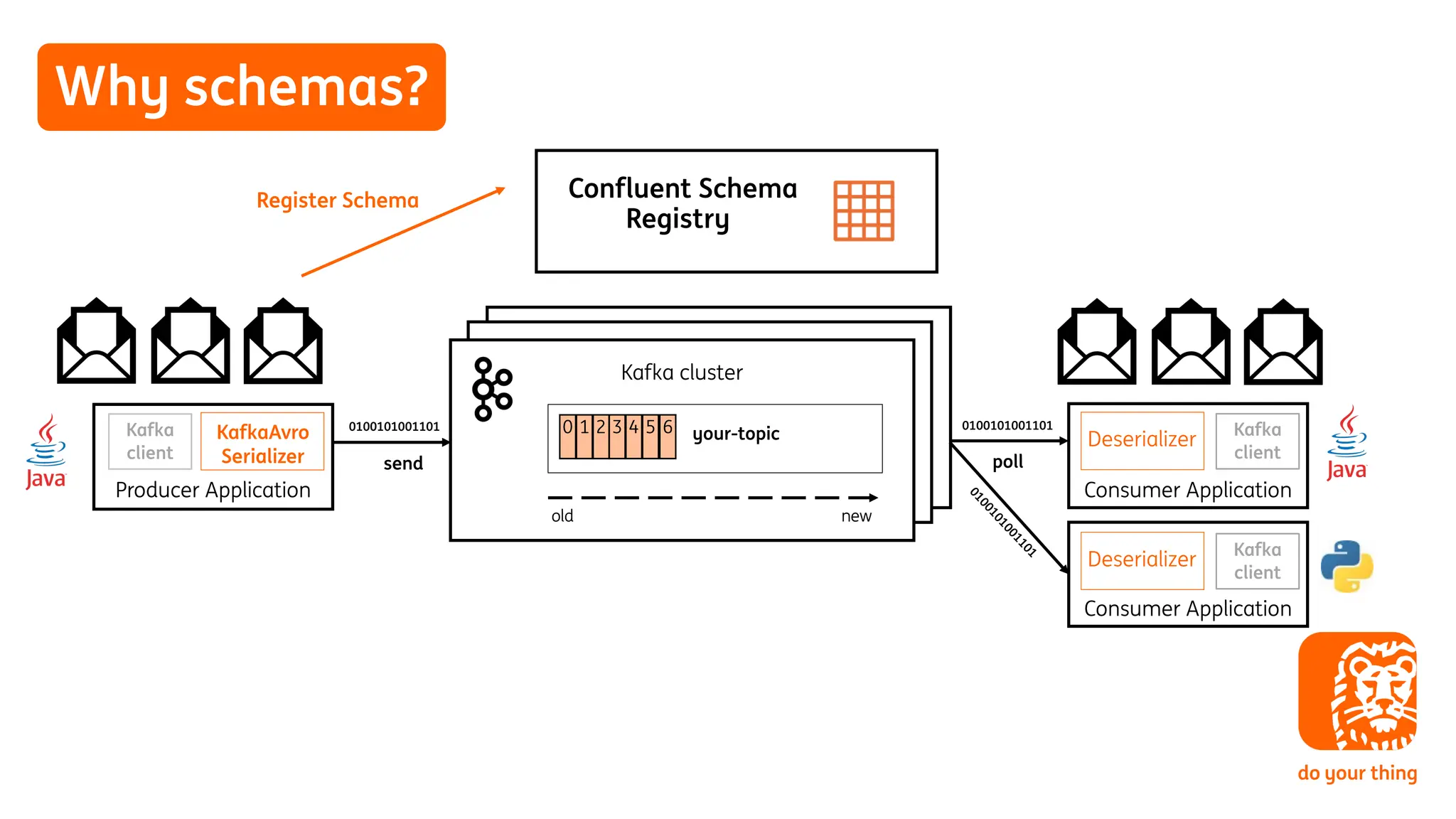
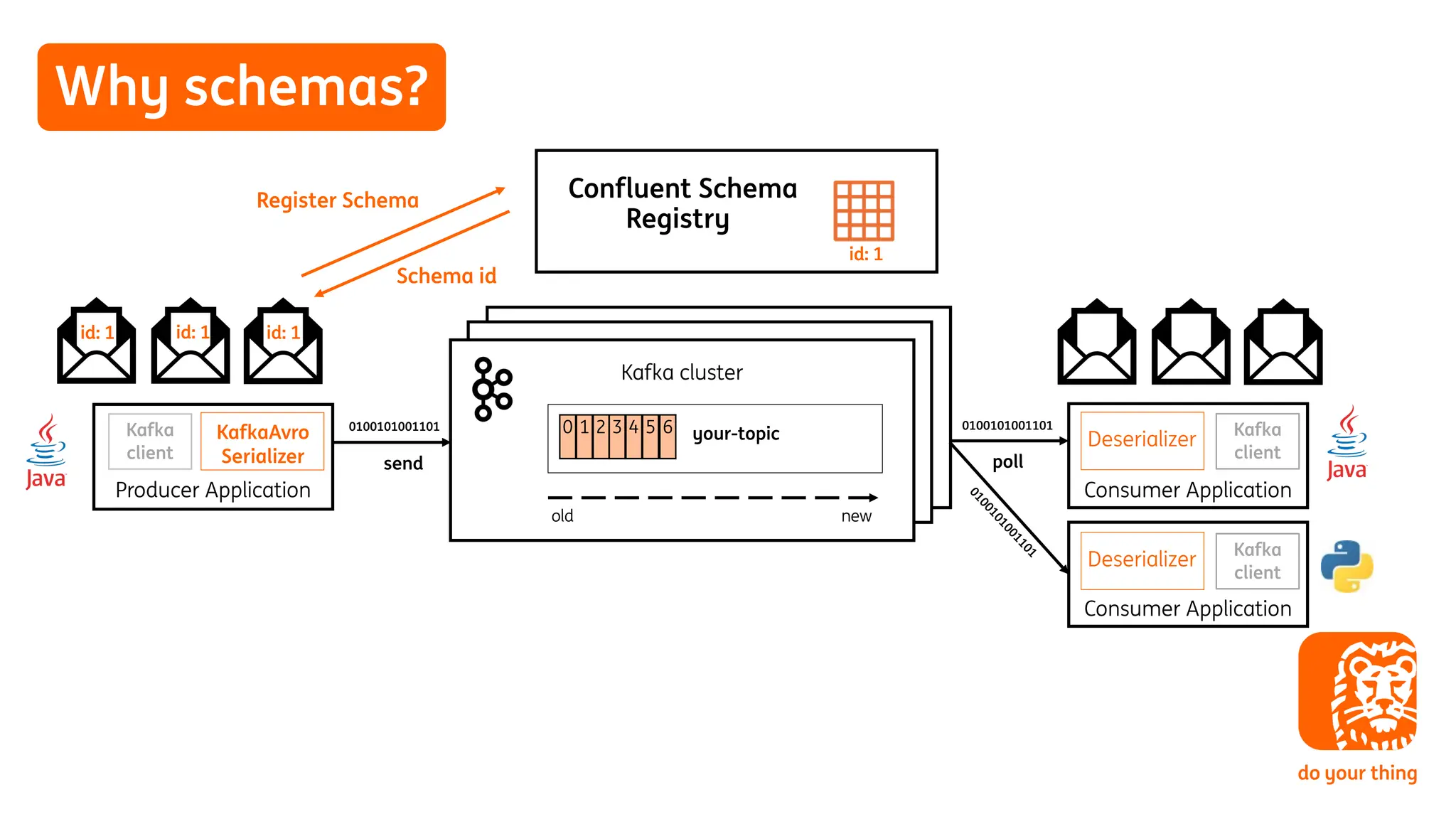
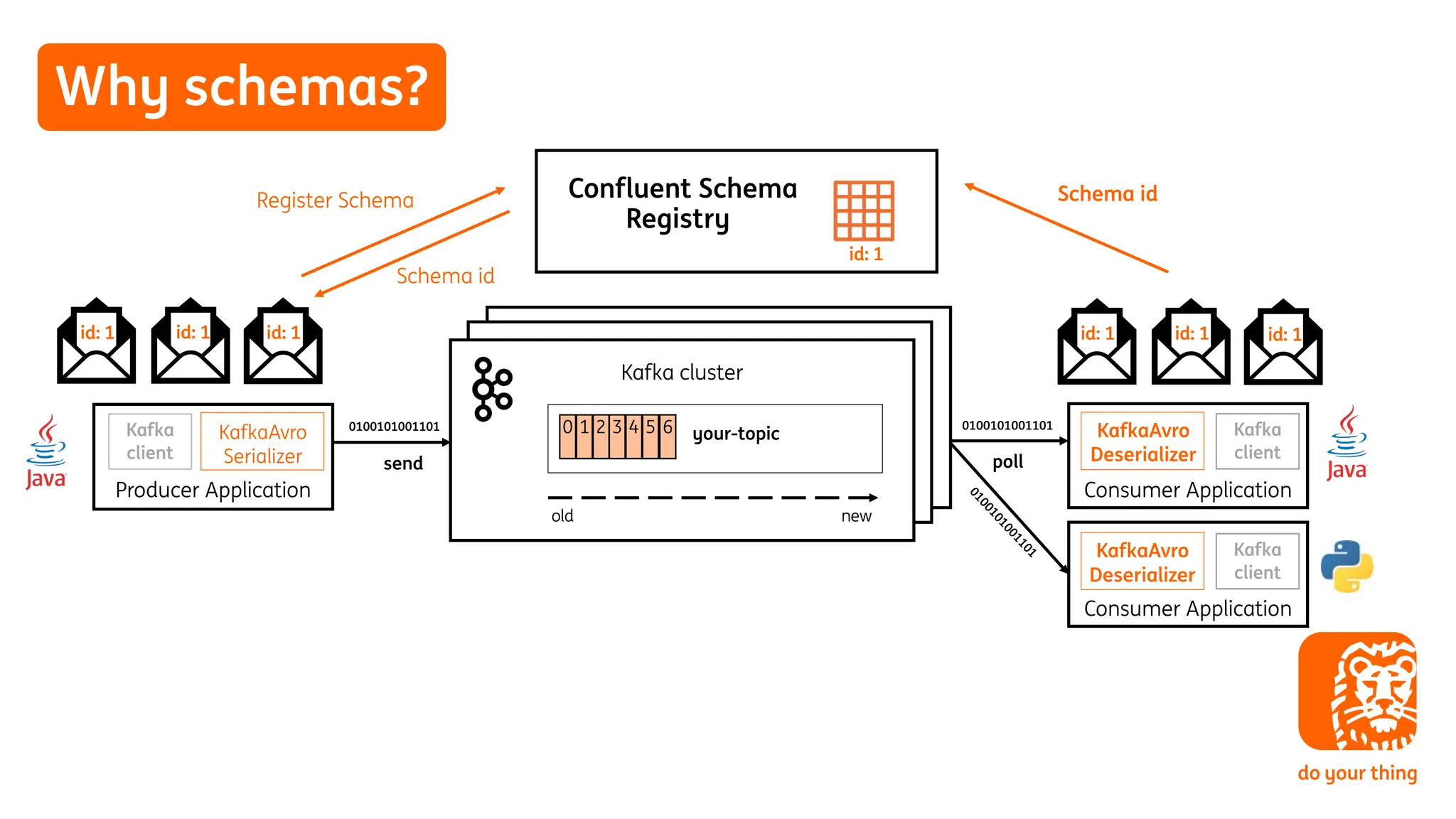
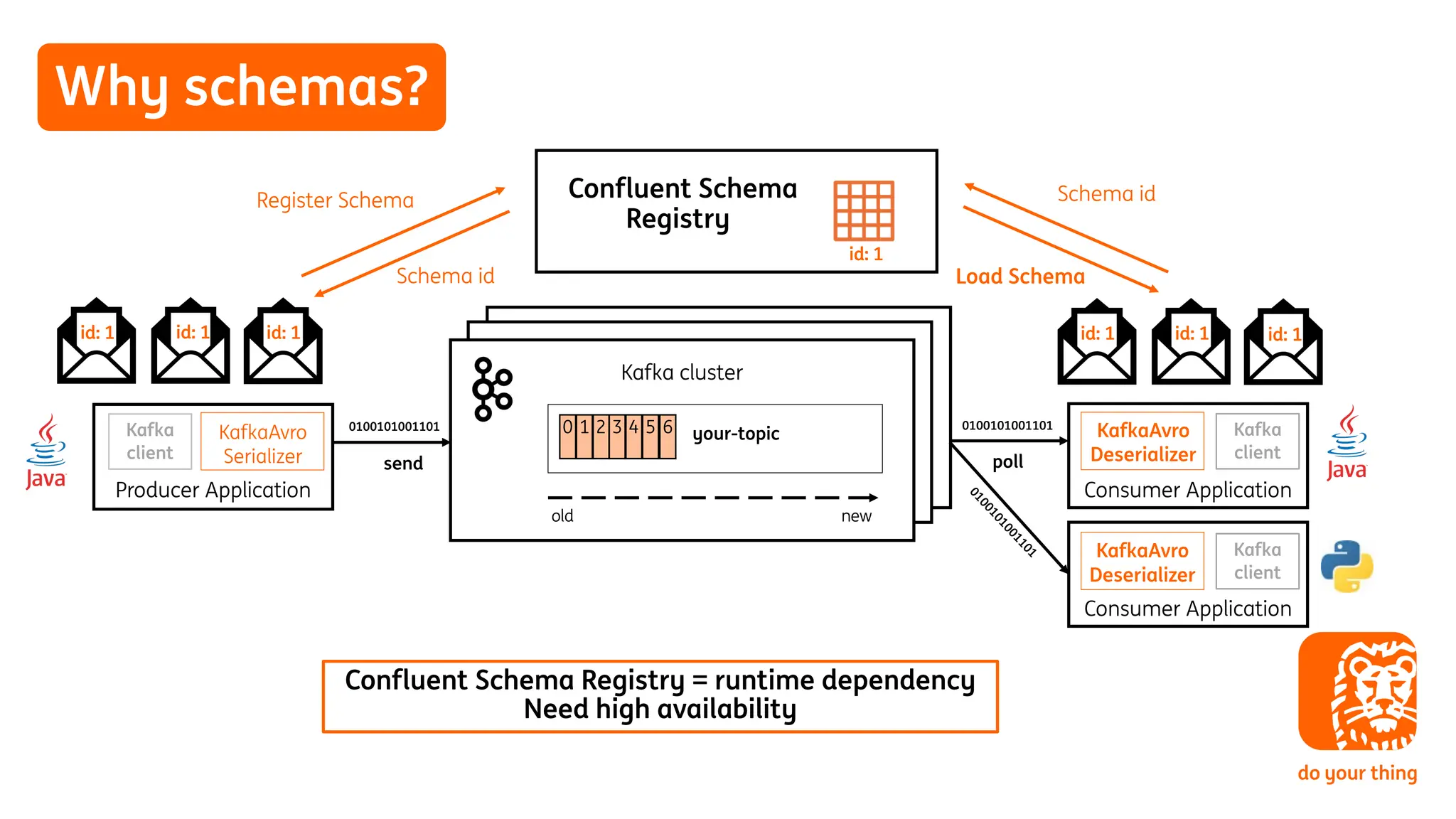
![Avro
§ At ING we prefer Avro
§ Apache Avro™ is a data serialization system
offering rich data structures and uses a compact
and binary format.
{
"type": "record",
"namespace": "com.example",
"name": "Customer",
"fields": [
{ "name": ”name", "type": "string” },
{ "name": ”isJointAccountHolder", "type": ”boolean "}
]
}
{
"name": ”Jack",
"isJointAccountHolder": true
}](https://image.slidesharecdn.com/bs05-20240319-ksl24-ing-timvanbaarsenandkostachuturkov-240402152349-ea2a9581/75/Evolve-Your-Schemas-in-a-Better-Way-A-Deep-Dive-into-Avro-Schema-Compatibility-and-Schema-Registry-25-2048.jpg)
![Avro field types
q primitive types (null, boolean, int, long, float, double, bytes, and string)
q complex types (record, enum, array, map, union, and fixed).
q Logical types(decimal, uuid, date…)
{
"type": "record",
"namespace": "com.example",
"name": "Customer",
"fields": [
{ "name": ”name", "type": "string” },
{ "name": ”isJointAccountHolder", "type": ”boolean "},
{ "name": "country", "type": { "name": "Country", "type": "enum", "symbols" : ["US", "UK", "NL"] } },
{ "name": ”dateJoined", "type": ”long”, ”logicalType": ” timestamp-millis” }
]
}
{
"name": ”Jack",
"isJointAccountHolder": true,
”country": ”UK”,
”dateJoined": 1708944593285
}](https://image.slidesharecdn.com/bs05-20240319-ksl24-ing-timvanbaarsenandkostachuturkov-240402152349-ea2a9581/75/Evolve-Your-Schemas-in-a-Better-Way-A-Deep-Dive-into-Avro-Schema-Compatibility-and-Schema-Registry-26-2048.jpg)
![Maps
Note: the values type applies for the values in the map. The keys are strings.
Example java Map representation:
Map<String, Long> customerPropertiesMap = new HashMap<>();
{
"type": "record",
"namespace": "com.example",
"name": "Customer",
"fields": [
{ "name": "name", "type": "string" },
{ "name": "isJointAccountHolder", "type": "boolean "},
{ "name": "country", "type": { "name": "Country", "type": "enum", "symbols": ["US", "UK", "NL"]}},
{ "name": "dateJoined", "type": "long", "logicalType": " timestamp-millis"},
{ "name": "customerPropertiesMap", "type": { "type": "map", "values": "long" }}
]
}
{
"name": ”Jack",
"isJointAccountHolder": true,
”country": ”UK”,
”dateJoined": 1708944593285,
“customerPropertiesMap”:
{”key1": 1708, ”key2": 1709}
}](https://image.slidesharecdn.com/bs05-20240319-ksl24-ing-timvanbaarsenandkostachuturkov-240402152349-ea2a9581/75/Evolve-Your-Schemas-in-a-Better-Way-A-Deep-Dive-into-Avro-Schema-Compatibility-and-Schema-Registry-27-2048.jpg)
![Fixed
{
"type": "record",
"namespace": "com.example",
"name": "Customer",
"fields": [
{ "name": "name", "type": "string" },
{ "name": "isJointAccountHolder", "type": "boolean "},
{ "name": "country", "type": { "name": "Country", "type": "enum", "symbols": ["US", "UK", "NL"]}},
{ "name": "dateJoined", "type": "long", "logicalType": " timestamp-millis"},
{ "name": "customerPropertiesMap", "type": { "type": "map", "values": "long" }, "doc": "Customer
properties"},
{ "name": "annualIncome", "type": ["null", {"name": "AnnualIncome", "type": "fixed", "size":
32}],"doc": "Annual income of the Customer.", "default": null}
]
}
{
"name": ”Jack",
"isJointAccountHolder": true,
”country": ”UK”,
”dateJoined": 1708944593285,
“customerPropertiesMap”:
{”key1": 1708, ”key2": 1709},
”annualIncome": [64, -9, 92, …]
}](https://image.slidesharecdn.com/bs05-20240319-ksl24-ing-timvanbaarsenandkostachuturkov-240402152349-ea2a9581/75/Evolve-Your-Schemas-in-a-Better-Way-A-Deep-Dive-into-Avro-Schema-Compatibility-and-Schema-Registry-28-2048.jpg)
![Unions
• Unions are represented using JSON arrays
• For example, ["null", "string"] declares a schema which may be either a
null or string.
• Question: Who thinks this a valid definition?
{
….
"fields": [
{
"name": "firstName",
"type": ["null", "string"],
"doc": "The first name of the Customer."
}
,…]
{
….
"fields": [
{
"name": "firstName",
"type": ["null", "string”, “int”],
"doc": "The first name of the Customer."
}
,…]
org.apache.kafka.common.errors.SerializationException: Error
serializing Avro message…
…
Caused by: org.apache.avro.UnresolvedUnionException: Not in union
["null","string","int"]: true](https://image.slidesharecdn.com/bs05-20240319-ksl24-ing-timvanbaarsenandkostachuturkov-240402152349-ea2a9581/75/Evolve-Your-Schemas-in-a-Better-Way-A-Deep-Dive-into-Avro-Schema-Compatibility-and-Schema-Registry-29-2048.jpg)
![Aliases
{
….
"fields": [
{
"name": ”customerName",
"aliases": [
”name"
],
"type": "string”,
"doc": "The name of the Customer.",
"default": null
}
,…]
{
….
"fields": [
{
"name": ”name",
"type": "string”,
"doc": "The name of the Customer.",
"default": null
}
,…]
• Named types and fields may have aliases
• Aliases function by re-writing the writer's schema using aliases from the reader's schema.
Consumer
Producer](https://image.slidesharecdn.com/bs05-20240319-ksl24-ing-timvanbaarsenandkostachuturkov-240402152349-ea2a9581/75/Evolve-Your-Schemas-in-a-Better-Way-A-Deep-Dive-into-Avro-Schema-Compatibility-and-Schema-Registry-30-2048.jpg)
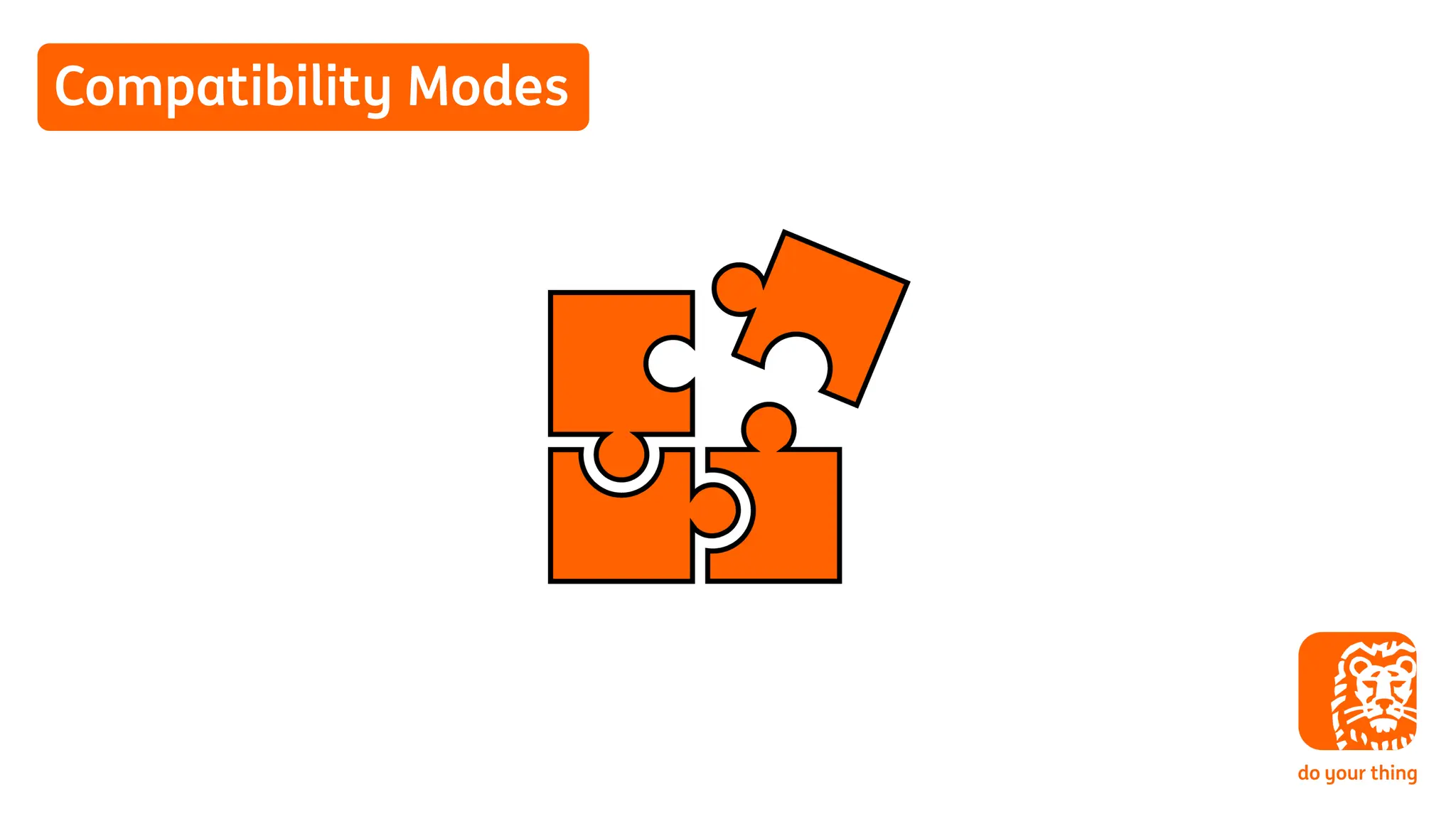
![BACKWARD
{
"type": "record",
"namespace": "com.example",
"name": "Customer",
"version": "1",
"fields": [
{ "name": ”name", "type": "string” },
{ "name": "occupation", "type": "string "}
]
}
Producer 1: V1
{
"type": "record",
"namespace": "com.example",
"name": "Customer",
"version": "1",
"fields": [
{ "name": ”name", "type": "string” },
{ "name": "occupation", "type": "string "}
]
}
Consumer 1 read: V1
Consumer
Producer
{
"type": "record",
"namespace": "com.example",
"name": "Customer",
"version": "2",
"fields": [
{ "name": " name ", "type": "string "},
{ "name": "occupation", "type": "string "}
}
Consumer 2 read: V2 (Delete field)](https://image.slidesharecdn.com/bs05-20240319-ksl24-ing-timvanbaarsenandkostachuturkov-240402152349-ea2a9581/75/Evolve-Your-Schemas-in-a-Better-Way-A-Deep-Dive-into-Avro-Schema-Compatibility-and-Schema-Registry-32-2048.jpg)
![BACKWARD
{
"type": "record",
"namespace": "com.example",
"name": "Customer",
"version": "2",
"fields": [
{ "name": " name ", "type": "string "},
{ "name": "occupation", "type": "string "}
}
Producer 1: V2
{
"type": "record",
"namespace": "com.example",
"name": "Customer",
"version": "2",
"fields": [
{ "name": " name ", "type": "string "},
{ "name": "occupation", "type": "string "}
}
Consumer 1 read: V2
Consumer
Producer
{
"type": "record",
"namespace": "com.example",
"name": "Customer",
"version": "2",
"fields": [
{ "name": " name ", "type": "string "},
{ "name": "occupation", "type": "string "}
}
Consumer 2 read: V2 (Delete field)
{
"type": "record",
"namespace": "com.example",
"name": "Customer",
"version": ”3",
"fields": [
{ "name": "name ", "type": "string ”},
{ "name": "occupation", "type": "string"},
{ "name": " annualIncome", "type": ["null","int"],"default": null}
Consumer 3 read: V3 (Add optional field)](https://image.slidesharecdn.com/bs05-20240319-ksl24-ing-timvanbaarsenandkostachuturkov-240402152349-ea2a9581/75/Evolve-Your-Schemas-in-a-Better-Way-A-Deep-Dive-into-Avro-Schema-Compatibility-and-Schema-Registry-33-2048.jpg)
![BACKWARD TRANSITIVE
{
"type": "record",
"namespace": "com.example",
"name": "Customer",
"version": "1",
"fields": [
{ "name": ”name", "type": "string” },
{ "name": "occupation", "type": "string "}
]
}
Producer: V1
{
"type": "record",
"namespace": "com.example",
"name": "Customer",
"version": "2",
"fields": [
{ "name": " name ", "type": "string "},
{ "name": "occupation", "type": "string "}
}
Consumer read: V2 (Delete field)
Consumer
Producer
{
"type": "record",
"namespace": "com.example",
"name": "Customer",
"version": ”3",
"fields": [
{ "name": "name ", "type": "string ”},
{ "name": "occupation", "type": "string"},
{ "name": " annualIncome", "type": ["null","int"],"default": “null”}
]
}
Consumer read: V3 (Add optional field)
{
"type": "record",
"namespace": "com.example",
"name": "Customer",
"version": ”…n",
"fields": [
{ "name": "name ", "type": "string ”},
{ "name": "occupation", "type": "string"},
{ "name": " annualIncome", "type": ["null","int"],"default": null}
]
}
Consumer read: V…n (Delete field)
Compatible](https://image.slidesharecdn.com/bs05-20240319-ksl24-ing-timvanbaarsenandkostachuturkov-240402152349-ea2a9581/75/Evolve-Your-Schemas-in-a-Better-Way-A-Deep-Dive-into-Avro-Schema-Compatibility-and-Schema-Registry-34-2048.jpg)
![FORWARD
Consumer
Producer
{
"type": "record",
"namespace": "com.example",
"name": "Customer",
"version": ”1",
"fields": [
{ "name": "name ", "type": "string ”},
{ "name": " annualIncome", "type": ["null"," double"],"default": null}
]
}
{
"type": "record",
"namespace": "com.example",
"name": "Customer",
"version": ”1",
"fields": [
{ "name": "name ", "type": "string ”},
{ "name": " annualIncome", "type": ["null",”double"],"default": null}
]
}
{
"type": "record",
"namespace": "com.example",
"name": "Customer",
"version": ”2",
"fields": [
{ "name": "name ", "type": "string ”},
{ "name": " annualIncome", "type": ["null",”double"],"default": null}
]
}
Producer write: V2 (Delete Optional Field)
{
"type": "record",
"namespace": "com.example",
"name": "Customer",
"version": ”3",
"fields": [
{ "name": "name ", "type": "string ”},
{ "name": " annualIncome", "type": ["null",”double"],"default": null},
{"name": "dateOfBirth", "type": "string", "doc": "The date of birth for the Customer."}
]
}
Producer write: V3 (Add Required Field)
Consumer read: V1
Producer write: V1](https://image.slidesharecdn.com/bs05-20240319-ksl24-ing-timvanbaarsenandkostachuturkov-240402152349-ea2a9581/75/Evolve-Your-Schemas-in-a-Better-Way-A-Deep-Dive-into-Avro-Schema-Compatibility-and-Schema-Registry-35-2048.jpg)
![FORWARD TRANSITIVE
{
"type": "record",
"namespace": "com.example",
"name": "Customer",
"version": ”3",
"fields": [
{ "name": "name ", "type": "string ”},
{ "name": "occupation", "type": "string"},
{ "name": " annualIncome", "type": ["null","int"],"default": null}
]
}
Producer: V2 (Delete Optional Field)
{
"type": "record",
"namespace": "com.example",
"name": "Customer",
"version": ”3",
"fields": [
{ "name": "name ", "type": "string ”},
{ "name": "occupation", "type": "string"},
{ "name": " annualIncome", "type": ["null","int"],"default": null},
{"name": "dateOfBirth", "type": "string”}
]
}
Producer: V3 (Add Field)
Consumer
Producer
{
"type": "record",
"namespace": "com.example",
"name": "Customer",
"version": ”3",
"fields": [
{ "name": "name ", "type": "string ”},
{ "name": "occupation", "type": "string"},
{ "name": " annualIncome", "type": ["null","int"],"default": null}
]
}
Consumer read: V1
{
"type": "record",
"namespace": "com.example",
"name": "Customer",
"version": ”…n",
"fields": [
{ "name": "name ", "type": "string ”},
{ "name": "occupation", "type": "string"},
{ "name": " annualIncome", "type": ["null","int"],"default": null},
{"name": "dateOfBirth", "type": "string"},
{"name": "phoneNumber", "type": "string”}
]
}
Producer: V..n (Add Field)
Compatible](https://image.slidesharecdn.com/bs05-20240319-ksl24-ing-timvanbaarsenandkostachuturkov-240402152349-ea2a9581/75/Evolve-Your-Schemas-in-a-Better-Way-A-Deep-Dive-into-Avro-Schema-Compatibility-and-Schema-Registry-36-2048.jpg)
![FULL
{
"type": "record",
"namespace": "com.example",
"name": "Customer",
"version": ”1",
"fields": [
{ "name": "name , "type": [”null",”string"],"default": null}
{ "name": "occupation , "type": [”null",”string"],"default": null}
{ "name": "annualIncome", "type": ["null","int"],"default": null},
{ "name": "dateOfBirth", "type": [”null",”string"],"default": null}
}
Producer: V1
{
"type": "record",
"namespace": "com.example",
"name": "Customer",
"version": "2",
"fields": [
{ "name": "name , "type": [”null",”string"],"default": null}
{ "name": "occupation , "type": [”null",”string"],"default": null}
{ "name": " annualIncome", "type": ["null","int"],"default": null},
{ "name": "dateOfBirth", "type": [”null",”string"],"default": null},
{ "name": "phoneNumber" , "type": [”null",”string"],"default": null}
}
Consumer read: V2
Consumer
Producer
NOTE:
• The default values apply only on the consumer side.
• On the producer side you need to set a value for the field](https://image.slidesharecdn.com/bs05-20240319-ksl24-ing-timvanbaarsenandkostachuturkov-240402152349-ea2a9581/75/Evolve-Your-Schemas-in-a-Better-Way-A-Deep-Dive-into-Avro-Schema-Compatibility-and-Schema-Registry-37-2048.jpg)
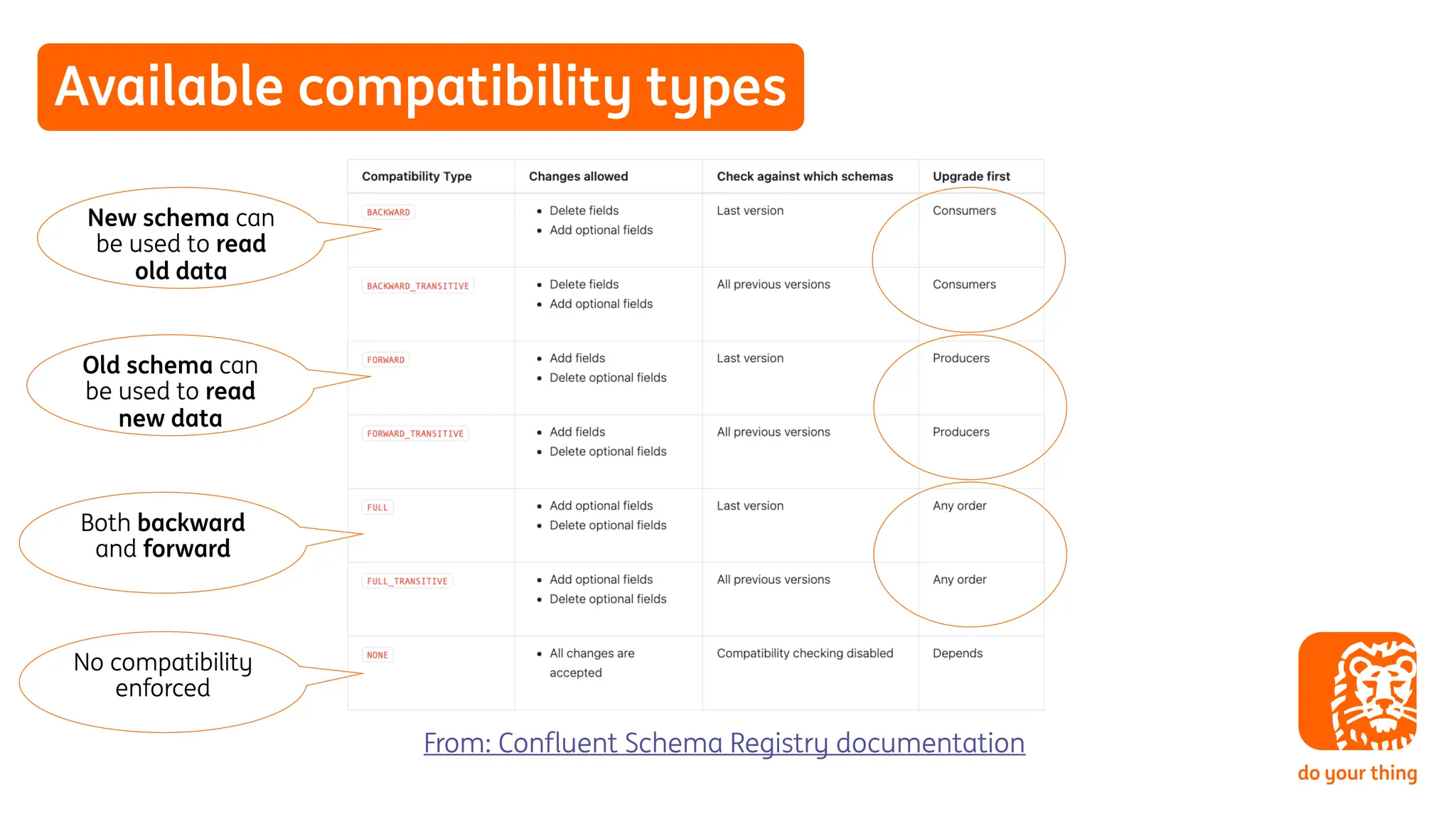
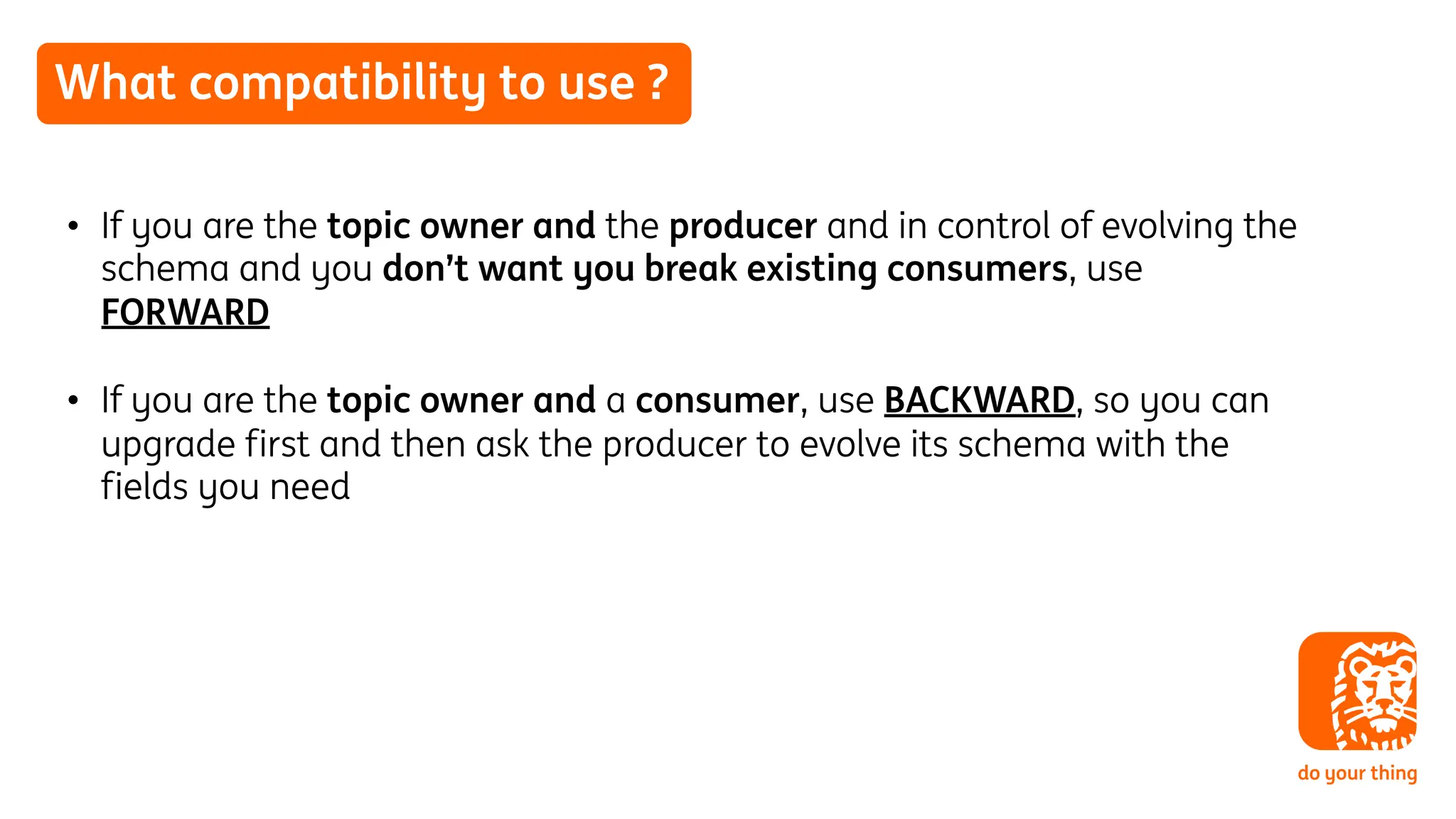
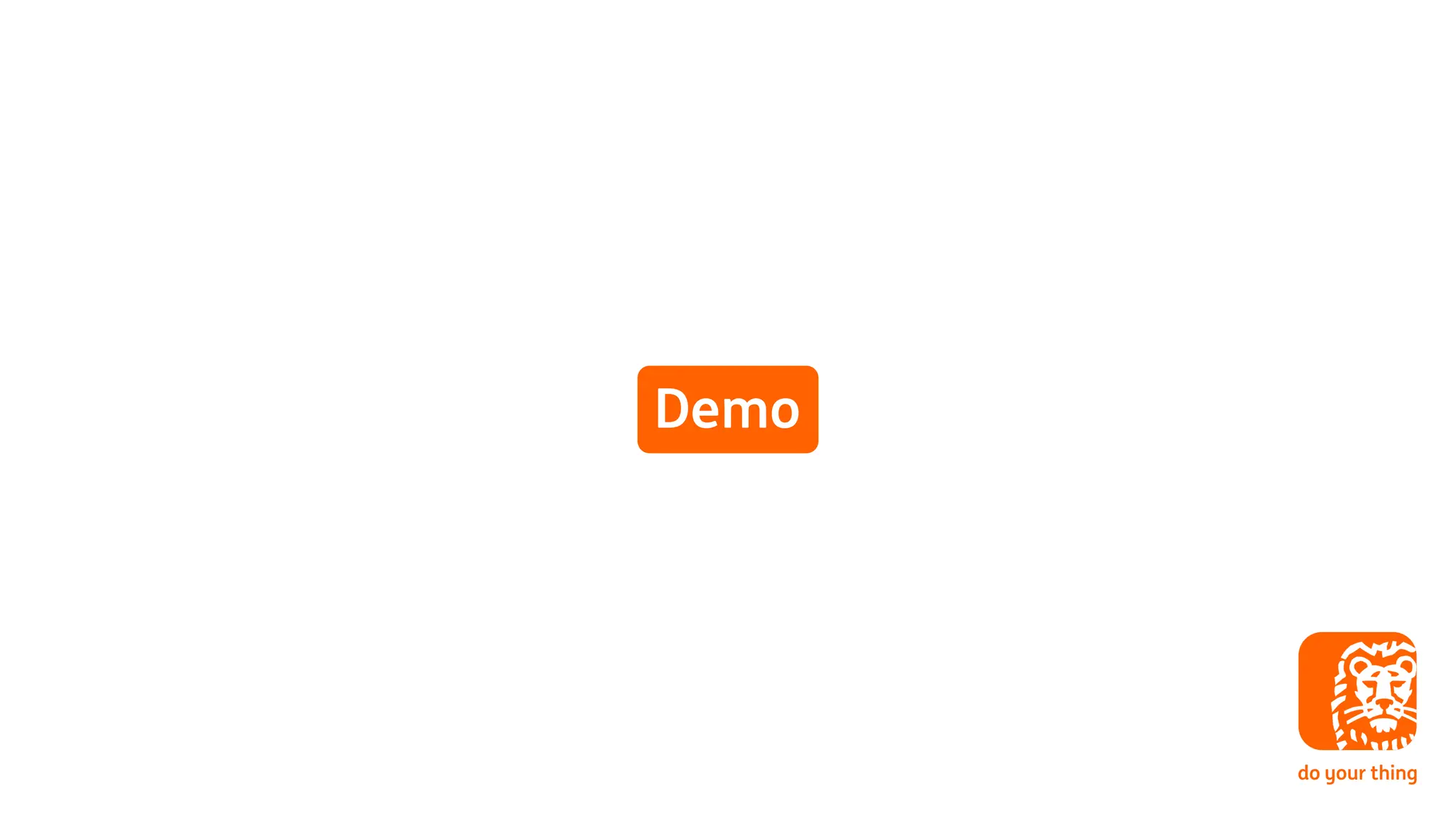
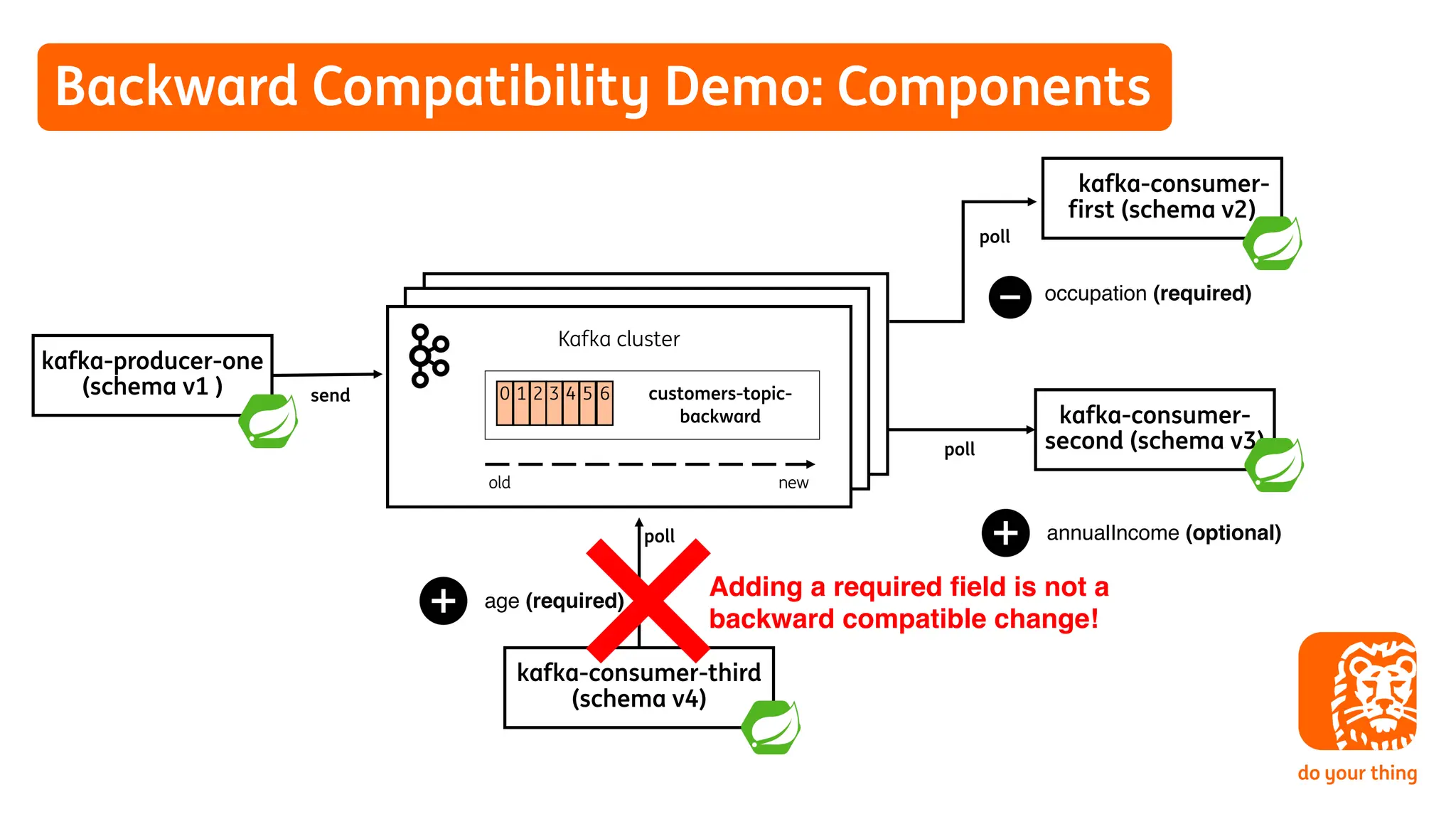
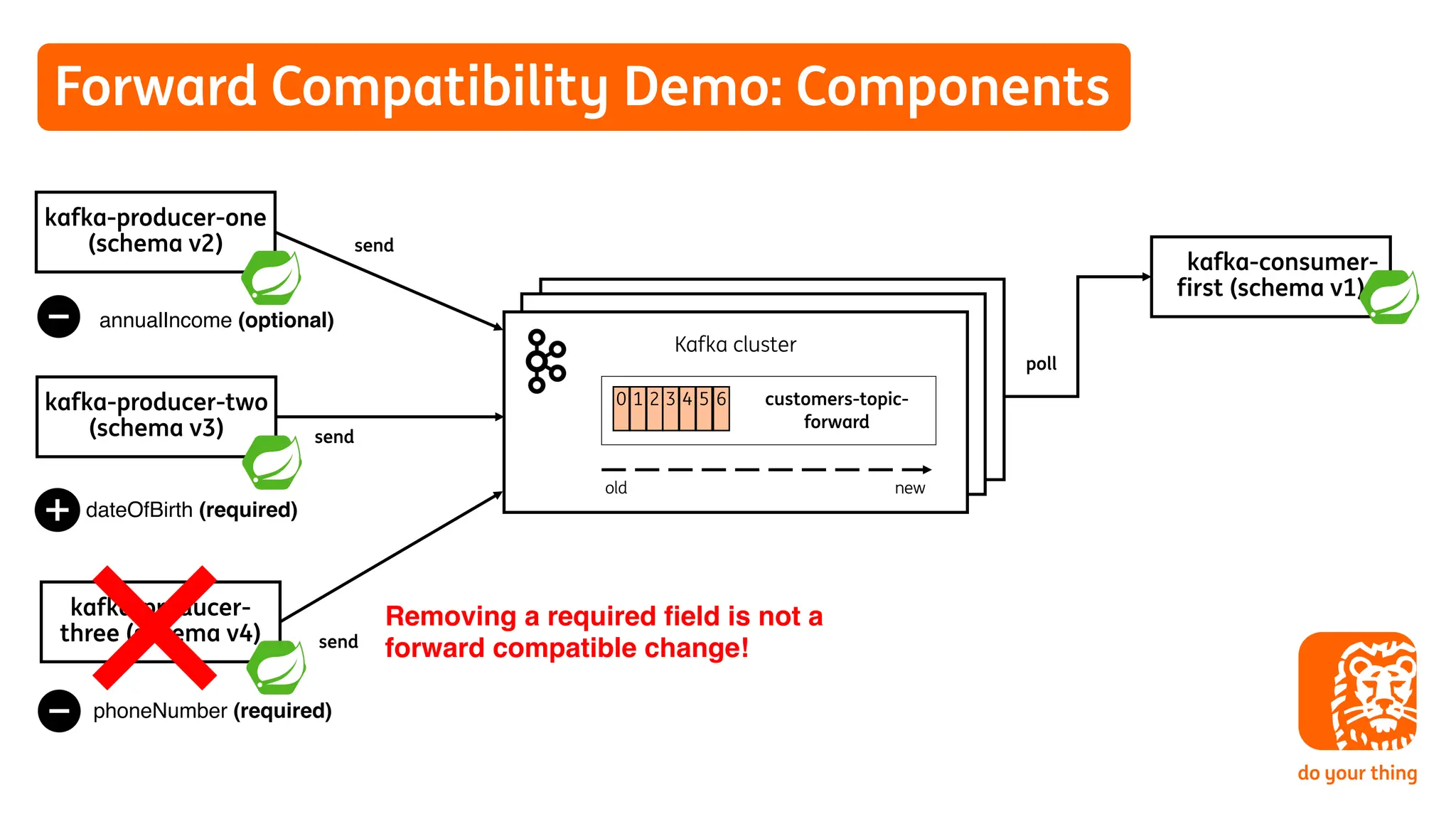
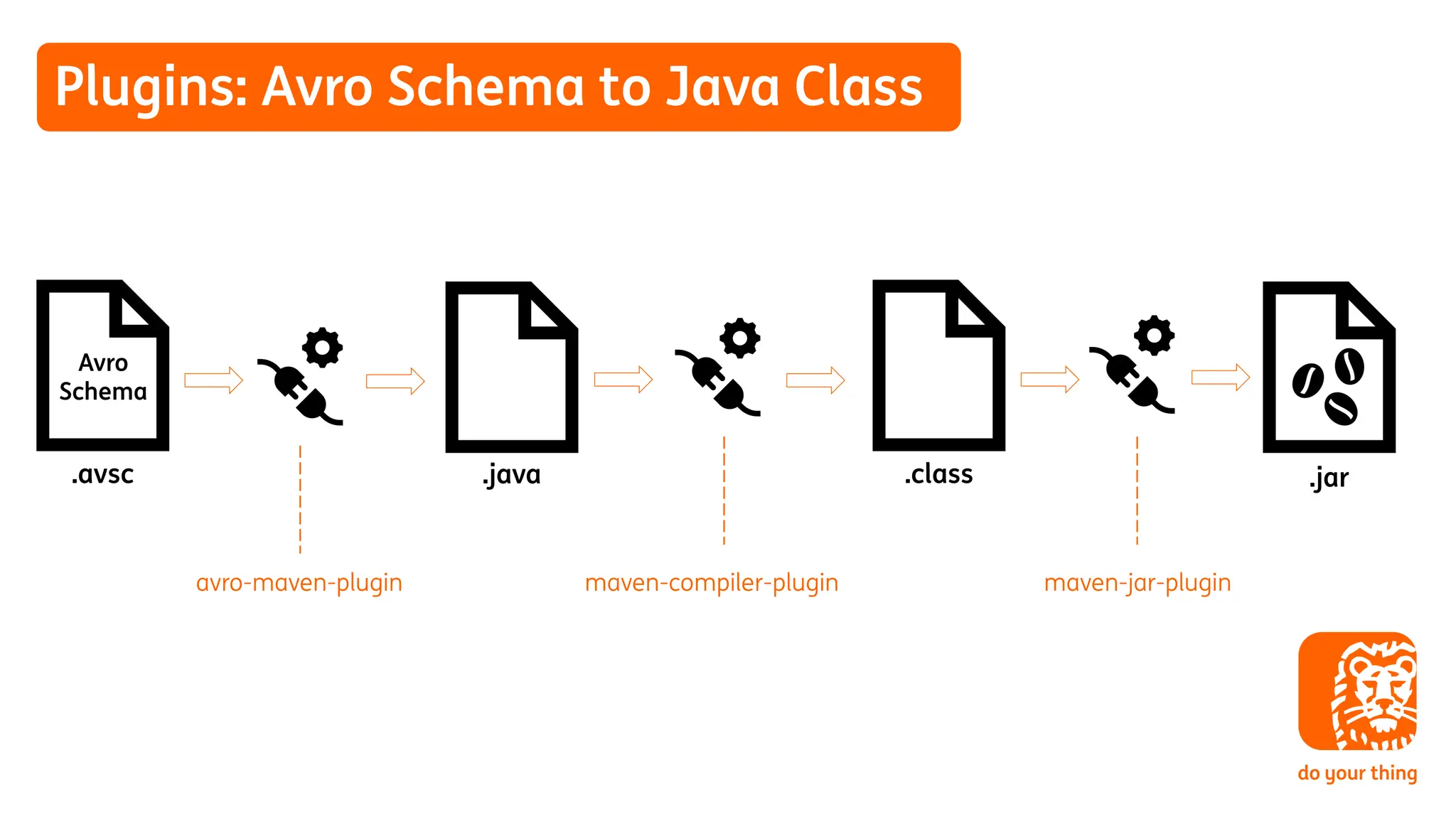
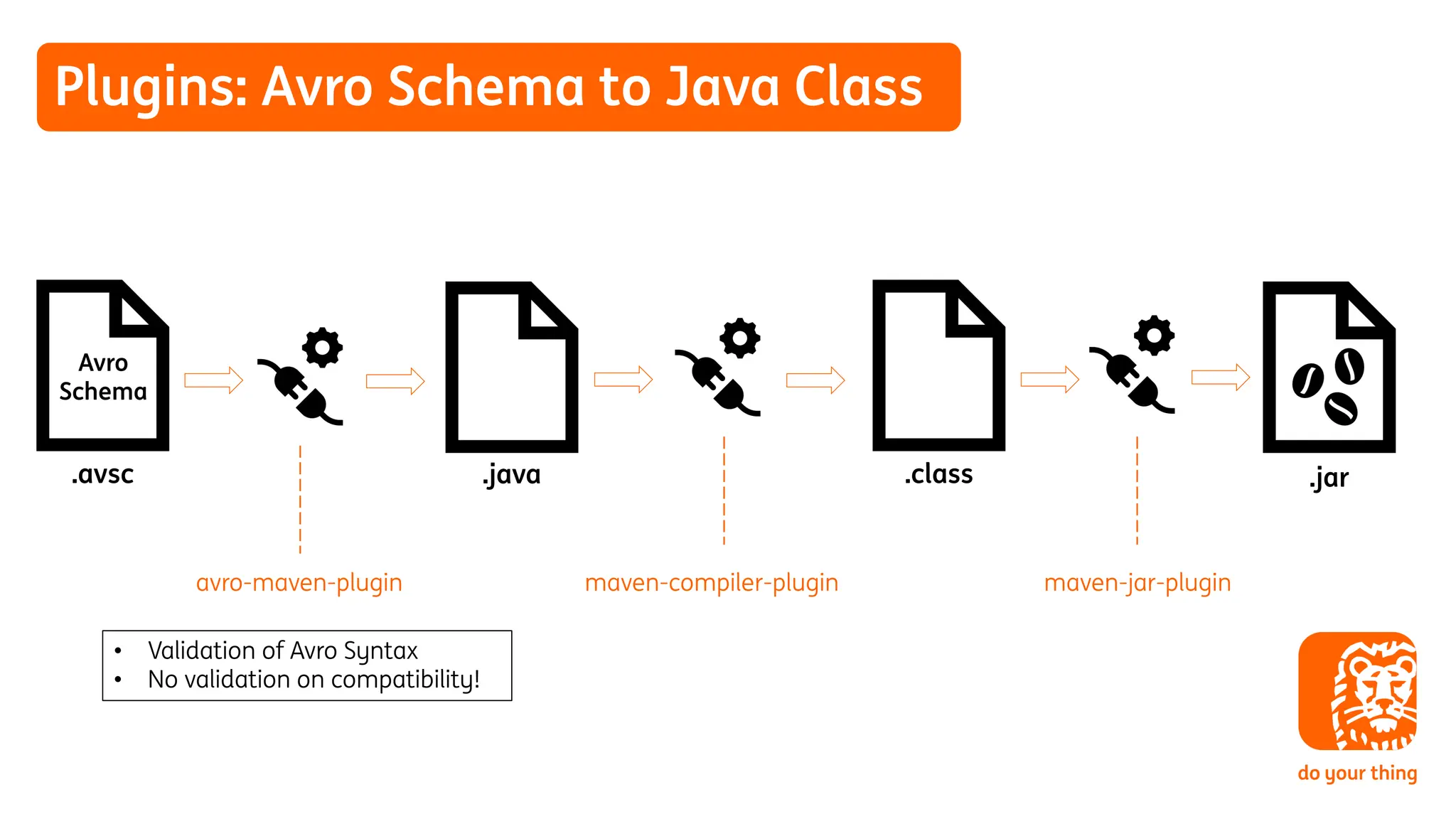
![package com.example.avro.customer;
/** Avro schema for our customer. */
@org.apache.avro.specific.AvroGenerated
public class Customer extends
org.apache.avro.specific.SpecificRecordBase implements
org.apache.avro.specific.SpecificRecord {
private static final long serialVersionUID = 1600536469030327220L;
public static final org.apache.avro.Schema SCHEMA$ = new
org.apache.avro.Schema.Parser().parse("{"type":"record","name":"
CustomerBackwardDemo","namespace":"com.example.avro.custom
er","doc":"Avro schema for our
customer.","fields":[{"name":"name","type":{"type":"string","
avro.java.string":"String"},"doc":"The name of the
Customer."},{"name":"occupation","type":{"type":"string","avro
.java.string":"String"},"doc":"The occupation of the
Customer."}],"version":1}");
…
}
{
"namespace": "com.example.avro.customer",
"type": "record",
"name": "Customer",
"version": 1,
"doc": "Avro schema for our customer.",
"fields": [
{
"name": "name",
"type": "string",
"doc": "The name of the Customer."
},
{
"name": "occupation",
"type": "string",
"doc": "The occupation of the Customer."
}
]
}
Plugins: Avro Schema to Java Class
Customer.avsc Customer.java](https://image.slidesharecdn.com/bs05-20240319-ksl24-ing-timvanbaarsenandkostachuturkov-240402152349-ea2a9581/75/Evolve-Your-Schemas-in-a-Better-Way-A-Deep-Dive-into-Avro-Schema-Compatibility-and-Schema-Registry-45-2048.jpg)
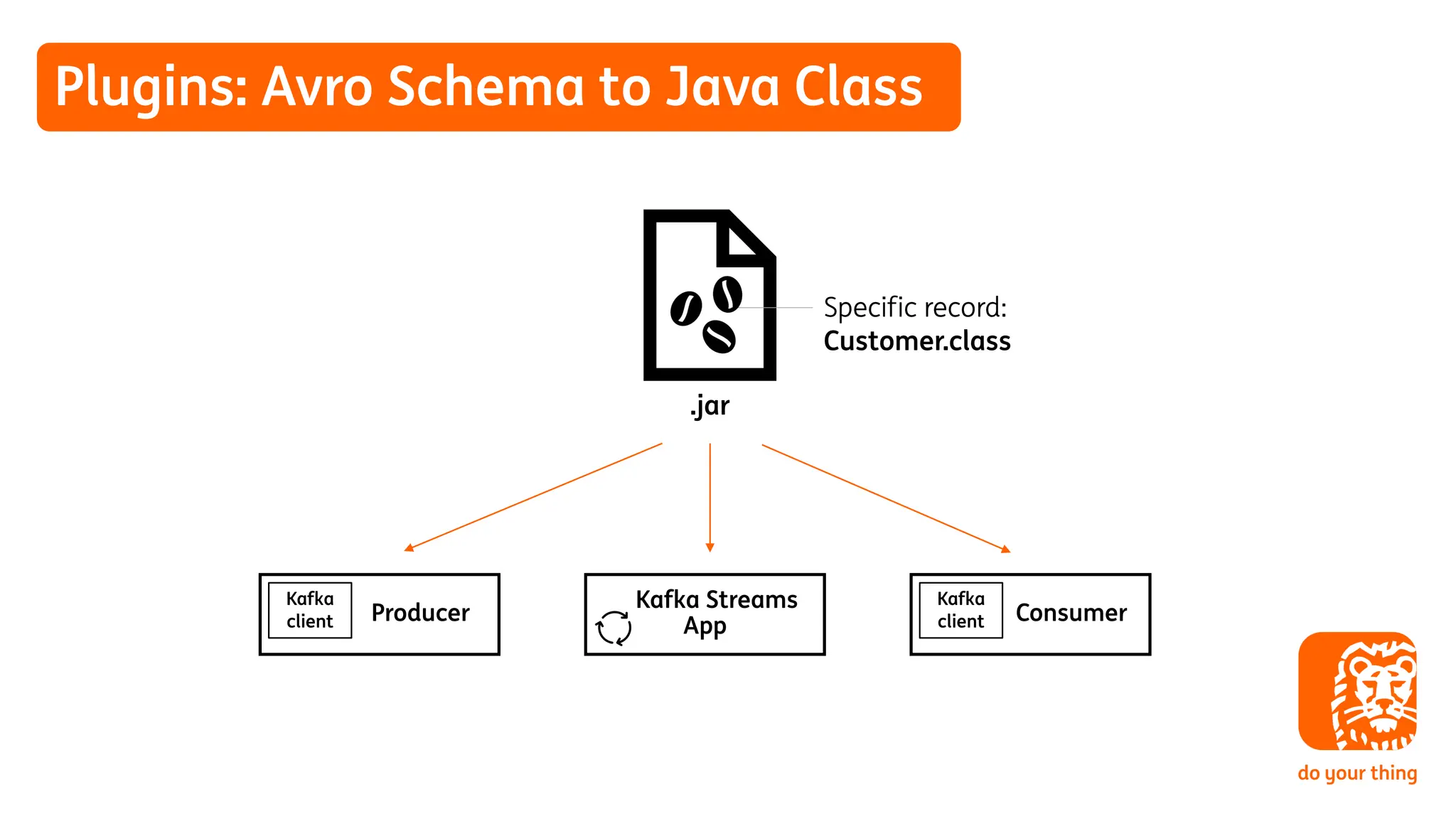
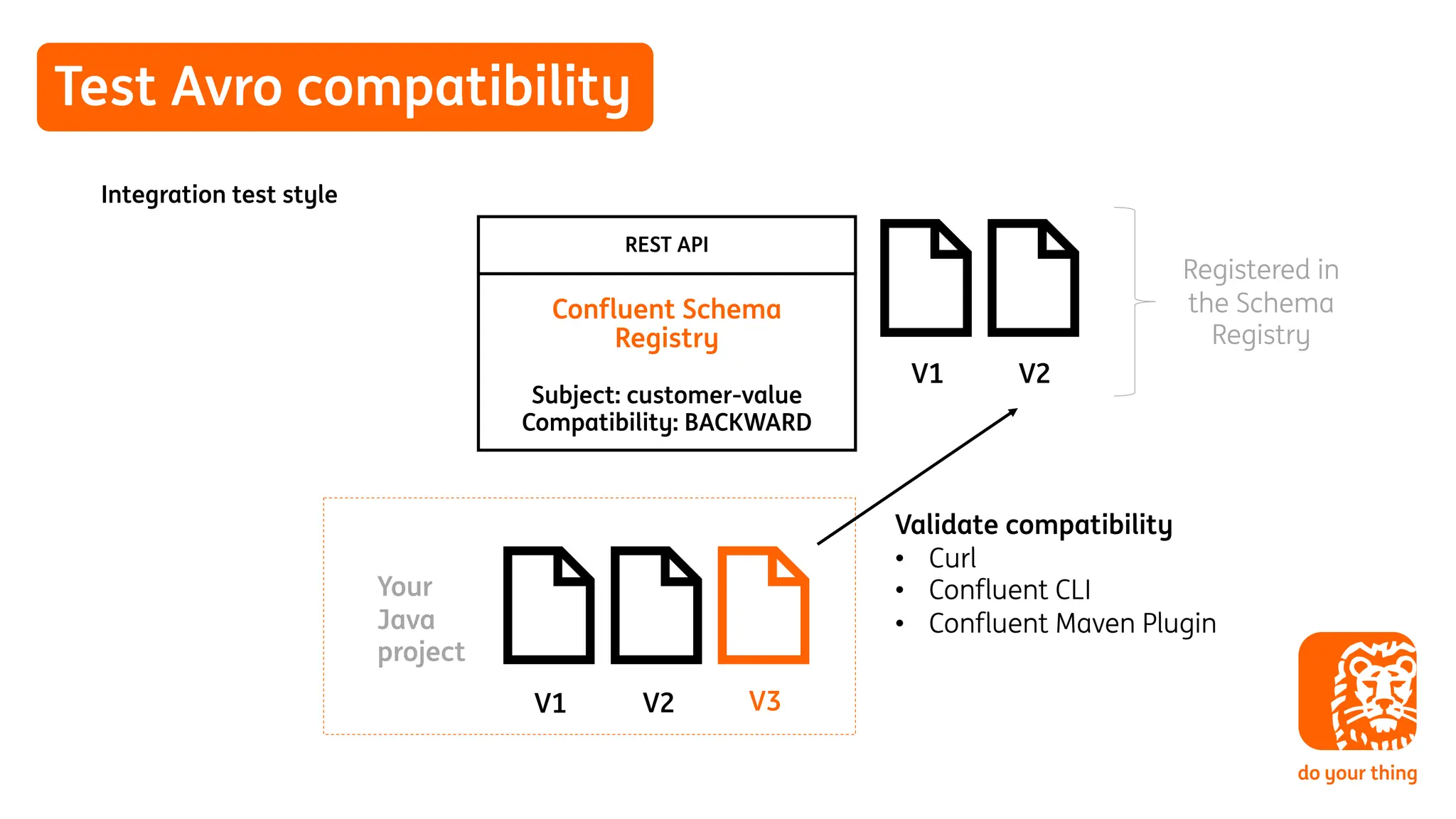
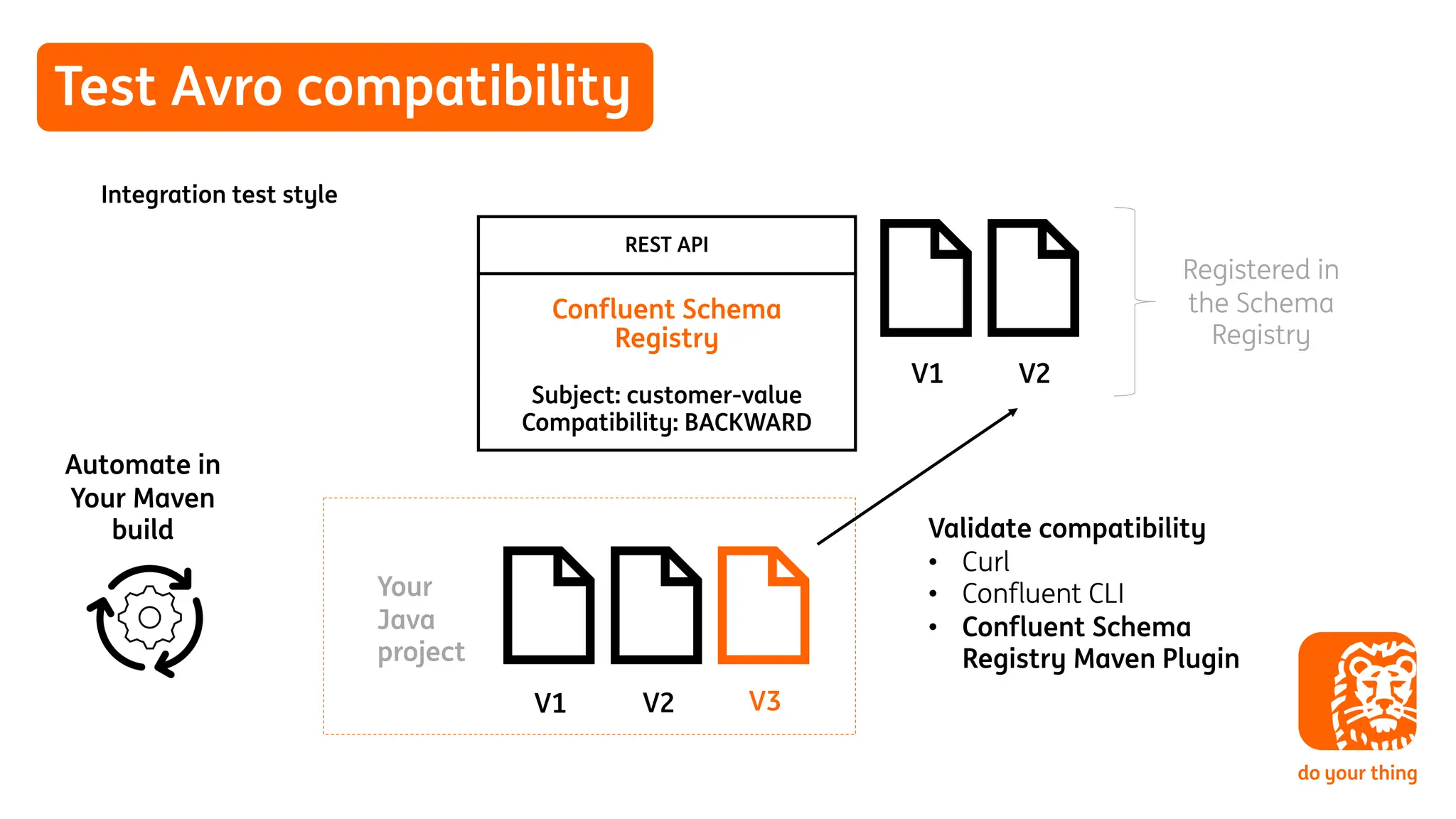
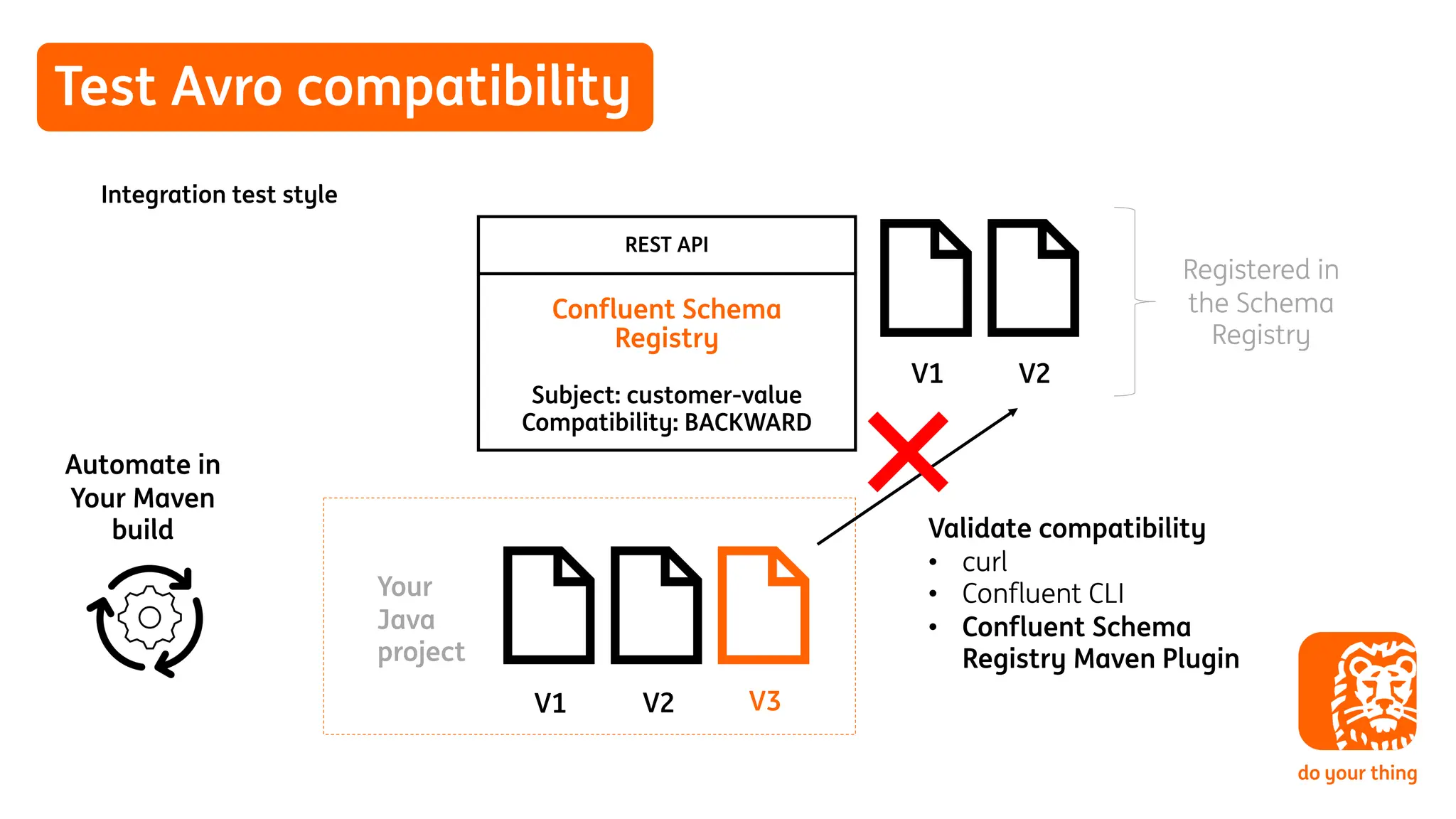
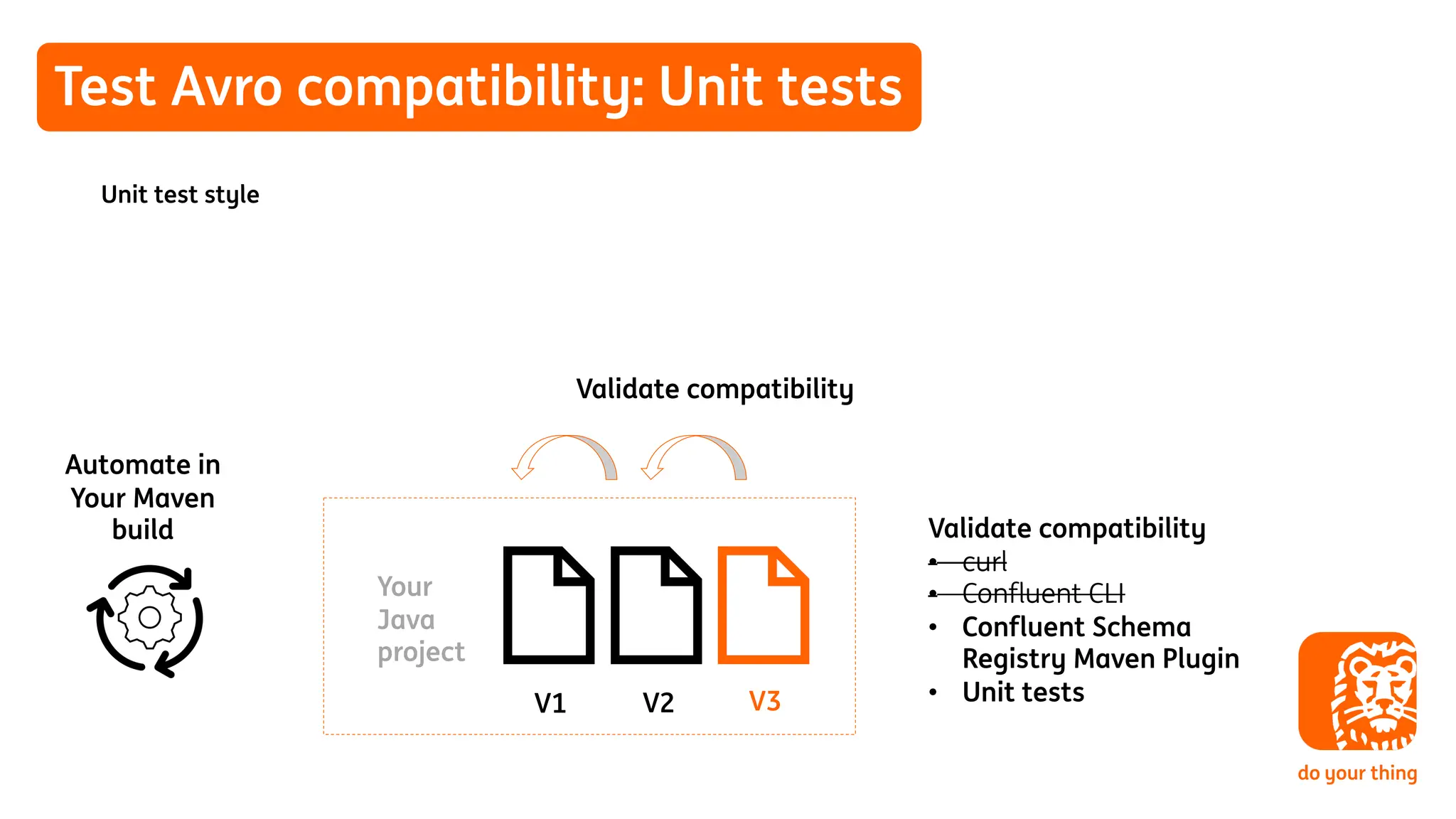
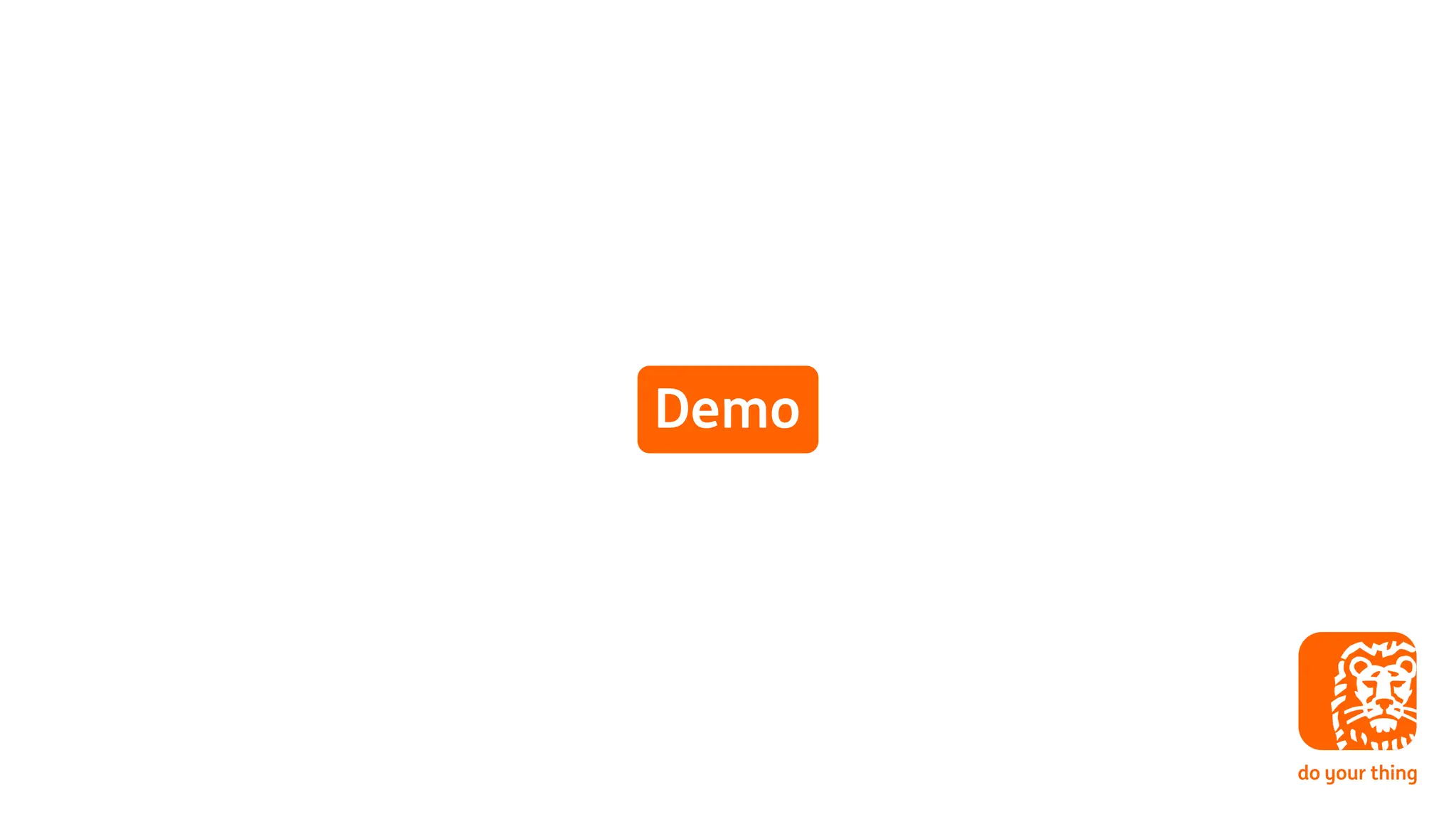
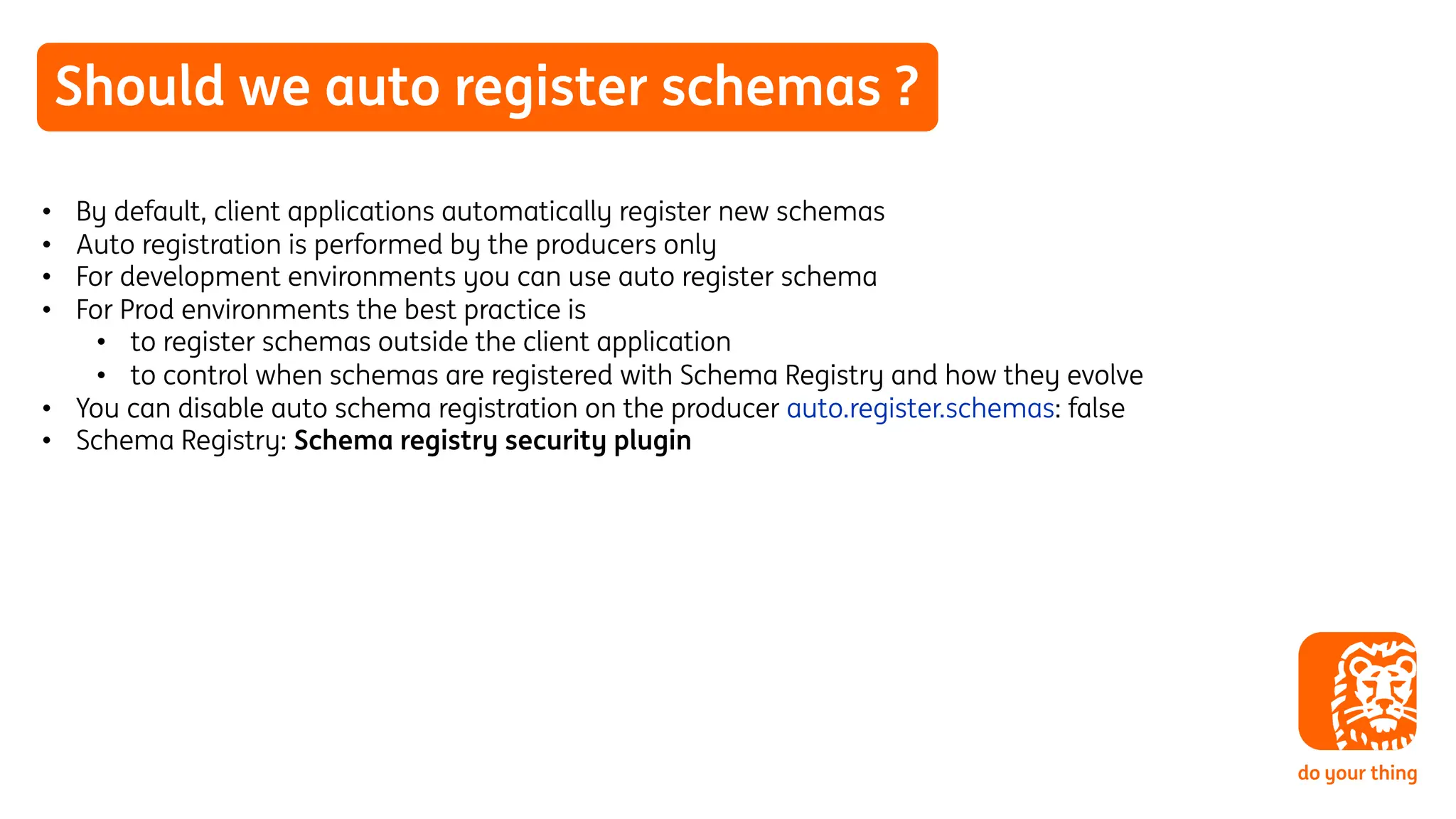
![package com.example.avro.customer;
/** Avro schema for our customer. */
@org.apache.avro.specific.AvroGenerated
public class Customer extends org.apache.avro.specific.SpecificRecordBase implements
org.apache.avro.specific.SpecificRecord {
private static final long serialVersionUID = 1600536469030327220L;
public static final org.apache.avro.Schema SCHEMA$ = new
org.apache.avro.Schema.Parser().parse("{"type":"record","name":"CustomerBackwardDemo
","namespace":"com.example.avro.customer","doc":"Avro schema for our
customer.","fields":[{"name":"name","type":{"type":"string","avro.java.string":"String"
},"doc":"The name of the
Customer."},{"name":"occupation","type":{"type":"string","avro.java.string":"String"},
"doc":"The occupation of the Customer."}],"version":1}");
…
}
Auto register schema lessons learned
• Maven Avro plugin: additional information appended to the schema in Java code
• Producer (KafkaAvroSerializer): auto.register.schemas: false
• When serializing the Avro Schema is derived from Customer Java object
{
"type": "record",
"namespace": "com.example",
"name": "Customer",
"fields": [
{
"name": ”name",
"type": "string”,
”doc": "The name of the Customer.”
}
]
}
Mismatch in schema comparison
Avro Schema (avsc) registered
in Schema Registry
Avro Schema (Java) in producer](https://image.slidesharecdn.com/bs05-20240319-ksl24-ing-timvanbaarsenandkostachuturkov-240402152349-ea2a9581/75/Evolve-Your-Schemas-in-a-Better-Way-A-Deep-Dive-into-Avro-Schema-Compatibility-and-Schema-Registry-53-2048.jpg)
![Auto register schema lessons learned
• If you are using the its recommented to set this property (KafkaAvroSerializer)
avro.remove.java.properties: true
Note:
There is an open issue for the Avro Maven Plugin for this AVRO-2838
{
"type": "record",
"namespace": "com.example",
"name": "Customer",
"fields": [
{
"name": ”name",
"type": "string”,
”doc": "The name of the Customer.”
}
]
}
{
"type": "record",
"namespace": "com.example",
"name": "Customer",
"fields": [
{
"name": ”name",
"type": "string”,
”doc": "The name of the Customer.”
}
]
}
No mismatch in schema comparison
Avro Schema (avsc) Avro Schema (as Java String)](https://image.slidesharecdn.com/bs05-20240319-ksl24-ing-timvanbaarsenandkostachuturkov-240402152349-ea2a9581/75/Evolve-Your-Schemas-in-a-Better-Way-A-Deep-Dive-into-Avro-Schema-Compatibility-and-Schema-Registry-54-2048.jpg)
